Congratulations to Dr. Bo Ning, recipient of Tulane SOM Bridge Funding for the project entitled “Sensitive Detection of the Lyme disease Agent Using a Novel Lab-in-Tube System”.
---------
Dr. Jia Fan Awarded $2.7M NIH U01 Grant
Dr. Jia Fan, Assistant Professor in the Department of Biochemistry and Molecular Biology, has been awarded a five-year, $2.7 million U01 grant from the National Institute of Allergy and Infectious Diseases (NIAID). The project, “Peptidome-Driven Algorithms for Faster and More Precise Mycobacterial Detection,” aims to advance diagnostic approaches for mycobacterial infections.
---------
Tulane’s Tony Hu awarded one of nation’s highest honors in clinical diagnostics (from Tulane News)
---------
New Method Speeds Up Detection of Elusive Lung Infections (Dr. Jia Fan)
----------
Congratulations to Dr. Jia Fan and Team. Bao D, Maity S, Zhan L, Seo S, Shu Q, Lyon CJ, Ning B, Zelazny A, Hu TY, Fan J. Precise mycobacterial species and subspecies identification using the PEP-TORCH peptidome algorithm. EMBO Mol Med. 2025 Mar 4. doi: 10.1038/s44321-025-00207-5. Epub ahead of print. PMID: 40038396.
----------
Congratulations to Dr. Wu-Min Deng, Professor in Biochemistry and Molecular Biology, Gerald & Flora Jo Mansfield Piltz Endowed Professor in Cancer Research, Tulane Cancer Center Member - Cancer Biology Research Program, is one of this year’s AAAS Honors Accomplished Scientists as a 2025 Elected Fellow. The American Association for the Advancement of Science bestows upon members the lifetime honor of being an elected Fellow in recognition of their extraordinary achievements in advancing science. The Fellows Forum will be held in Washington, D.C. on Saturday, June 7th, 2025.
------------
Congratulations to Tony Hu and Team. Julian G. Saliba, Wenshu Zheng, Qingbo Shu, Liqiang Li,Chi Wu, Yi Xie, Christopher J. Lyon, Jiuxin Qu, Hairong Huang, Binwu Ying, and Tony Ye Hu.“Enhanced diagnosis of multi-drug-resistantmicrobes using group association modeling and machine learning”. Link here.
--------------
Congratulations to Dr. Hua Lu, a recipient of the 2025 Ladies Leukemia League Grant, to fund the research project, “Role of Malfunctional RBM10-c-Myc Pathway in Hematopoietic Malignancies,” to be awarded Thursday, April 24th, 2025.
--------------
New Textbook, Dr. David Franklin
Emine E. Abali , Susan D. Cline , David S. Franklin , Susan M. Viselli Ph.D. Lippincott Illustrated Reviews: Biochemistry, February 25th, 2025.
A bestselling title in this highly regarded review series, Lippincott® Illustrated Reviews: Biochemistry is the go-to resource for both faculty and students for mastering the essentials of biochemistry. The fully revised 9th Edition helps students quickly review, assimilate, and integrate large amounts of critical and complex information, with unparalleled illustrations that bring concepts to life. An intuitive outline organization, chapter summaries, and review questions that link basic science to real-life clinical situations work together to clarify challenging information and strengthen retention and understanding, while an emphasis on clinical application, updated review tools, and accompanying digital resources prepare students for success on course and board exams and beyond.
---------------
Congratulations to Dr. Hua Lu and Team. Tan Z, Ko HM, Naji P, Zhu R, Wang J, Huang S, Zhang Y, Zeng SX, Lu H. Tripartite motif-containing protein 26 promotes colorectal cancer growth by inactivating p53. Cell Death Differ. 2025 Feb 24. doi: 10.1038/s41418-025-01463-1. Epub ahead of print. PMID: 39994352.
Abstract
Tripartite motif-containing protein 26 (TRIM26) is an E3 ubiquitin ligase that exhibits divergent roles in various cancer types (oncogenic and anti-oncogenic). This study investigates the interaction of TRIM26 with the tumor suppressor protein p53 in colorectal cancer (CRC) cells by performing a comprehensive set of biochemical, cell-based assays, and xenograft experiments. As a result, we found that overexpression of TRIM26 significantly enhances CRC cell proliferation and colony formation, while knockdown of TRIM26 suppresses these processes. Xenograft experiments further validated the tumor-promoting role of TRIM26 in CRC. Supporting this is that TRIM26 is highly expressed in human CRC tissues as revealed by our analysis of the TCGA database. Biochemically, TRIM26 directly bound to the C-terminus of p53 and facilitated its ubiquitination, resulting in proteolytic degradation and attenuated p53 activity independently of MDM2. Also, TRIM26 increased the MDM2-mediated ubiquitination of p53 by binding to MDM2's C-terminus. This study uncovers the oncogenic potential of TRIM26 in CRC by inhibiting p53 function. Through its ubiquitin ligase activity, TRIM26 destabilizes p53, consequently promoting CRC cell proliferation and tumor growth. These findings shed light on the complex involvement of TRIM26 in cancer and identify this ubiquitin ligase as a potential therapeutic target for future development of CRC treatment.
--------------
SAVE THE DATE! The 23rd Annual George Adrouny Memorial Lectureship, Friday, April 11th, 2025, keynote speaker Dr. Tony Hu.
Congratulations to Tony Hu, recipient of the Entrepreneurship Award! Presented at the Tulane 2024 Achievement Awards, Ritz Carlton, November 1st. This award is given to the individual faculty member whose contribution to entrepreneurship is reflected in a record of sustained entrepreneurship and new venture creation.
Wu-Min Deng, PhD, awarded $1.7 Million NCI R01 Grant
Congratulations to Tulane Cancer Center Member and Professor of Structural & Cellular Biology Wu-Min Deng, PhD, on receiving a 5-year, $1.7 million National Cancer Institute R01 Grant - Polyploidy and Sex Dimorphism in a Drosophila Tumor Model.
Congratulations to Dr. William Wimley and Team. Ferrie, R.P., Fuselier, T., and Wimley, W.C. (2024) Cytosolic Delivery of Bioactive Cyclic Peptide Cargo by Spontaneous Membrane Translocating Peptides. ACS Omega https://doi.org/10.1021/acsomega.3c08701
From Tulane News: Tulane to launch science communication program to help tackle global issues, click here
Congratulations to Dr. Tony Hu, elected to the International Academy of Medical and Biological Engineers (IAMBE), class of 2024.
A New Paper from Dr. William Wimley:
Structural Determinants of Peptide Nanopore Formation
A New Paper from Dr. Hong Liu:
Topolsomerase I is an evolutionarily conserved key regulator for DNA transcription
- Dr. Wu-Min Deng, recipient of an LCRC Seed Grant Proposal, June 1st, 2024-May 31st, 2025.
- Dr. Hee-Won Park, recipient of a Carol Lavin Bernick Faculty Grant, 2024-2025.
- Dr Yiwei Zhang, recipient of a Carol Lavin Bernick Faculty Grant, 2024-2025.
- Dr Xianfeng Wang, recipient of a Carol Lavin Bernick Faculty Grant, 2024-2025
- Dr. Hong Liu, recipient of a Carol Lavin Bernick Faculty Grant, 2024-2025
Congratulations to Dr. Wu-Min Deng, a recipient of a 2024 Ladies Leukemia League Grant, to fund the research project, “Targeting NKCC Dysregulation: A Therapeutic Approach for Ascites Management in Leukemia Patients,” to be awarded April 2024.
From Tulane News - Infections from these bacteria are on the rise. New blood test cuts diagnosis time from months to hours (featuring Dr. Bo Ning): https://news.tulane.edu/pr/infections-these-bacteria-are-rise-new-blood-test-cuts-diagnosis-time-months-hours
Congratulations to Dr. William Wimley and Team
Ferrie, R.P., Fuselier, T., and Wimley, W.C. (2024) Cytosolic Delivery of Bioactive Cyclic Peptide Cargo by Spontaneous Membrane Translocating Peptides. ACS Omega https://doi.org/10.1021/acsomega.3c08701
Tulane Receives $1.6 Million to Develop Nanoscale Drug Delivery
Creating holes in a cell is usually a bad thing, but researchers at Tulane have received a grant to study how they might create controlled nanopores as small as a molecule to deliver targeted medicine into cells.
Bill Wimley, the George A. Adrouny, PhD Professor in Biochemistry in the Department of Biochemistry and Molecular Biology in the Tulane School of Medicine, has been awarded a grant of $1.6 million from the National Institute of General Medical Studies to study nanopore technology.
This research uses a compound derived from melittin, a main component of honeybee venom, to make small pores in membranes. These pores are on the nanometer scale, hence the name “nanopores.”
“This peptide, melittin, it permeabilizes membranes and causes nonspecific damage to cells that way,” said Wimley, “so we took melittin and evolved it over multiple generations into peptides that are controllable, more useful and less toxic.”
These evolved peptides, which are short chains of amino acids, are not controlled by a remote or any electronics but by the pH, or acidity, of their environment. One family of these nanopore-forming peptides is triggered by an acidic environment.
“They are designed not to affect cells under normal conditions,” Wimley said.
They are triggered when endosomes, which take up material from the outside of cells, mature and acidify. It is only in that acidic environment that the peptides form nanopores in the cell membrane.
Nanopores allow for macromolecules, molecules too large to move through cell membranes under normal circumstances, to have a way into cells. This research could lead to breakthroughs in medicine delivery. This current grant, however, is looking at the more basic structural level of understanding of the technology. As Wimley put it, “What drives these very unusual nanopores to form in membranes?”
In order to learn more about these nanopores, Wimley and his team will start with computer simulations of their evolved peptides, then they will move toward laboratory testing in order to see what makes the peptides behave the way they do. Once they understand that, then more research can be done into potential life-saving applications.
The patent for this nanopore technology is shared between Tulane and Johns Hopkins University. Wimley will be working on this research with an international team that includes researchers in Romania and at Johns Hopkins.
SAVE THE DATE - 2024 George Adrouny Memorial Lecture, Tuesday, April 23rd
The 2024 featured speaker is Lila M. Gierasch, PhD, Distinguished Professor in the Departments of Biochemistry & Molecular Biology and Chemistry at the University of Massachusetts Amherst.
Dr. Gierasch is a biophysical chemist recognized for her work on protein folding, with particular emphasis on in vivo folding and roles of molecular chaperones. Born in Massachusetts, Gierasch graduated from Mount Holyoke College in 1970 with a degree in chemistry and obtained her Ph.D. in Biophysics from Harvard University in 1975. She held faculty positions at Amherst College, the University of Delaware, and the University of Texas Southwestern Medical School prior to joining the University of Massachusetts Amherst where she is currently Distinguished Professor of Biochemistry & Molecular Biology and Chemistry. In 2006, she received a NIH Director's Pioneer Award. Among her other honors are Sloan and Guggenheim Fellowships, the Vincent du Vigneaud and Merrifield Awards of the American Peptide Society, a D.Sc. Honoris Causa from Mount Holyoke College, the Garvan-Olin Medal and Ralph Hirschmann Award of the American Chemical Society, the Dorothy Hodgkin Award of the Protein Society, and the Mildred Cohn Award of the American Society of Biochemistry & Molecular Biology. Gierasch is Editor-in-Chief of the Journal of Biological Chemistry, a past President and a Fellow of the Biophysical Society, and a member of both the American Academy of Arts and Sciences and the National Academy of Sciences.
The Gierasch's Laboratory has made fundamental contributions to the relationship between amino acid sequence and the preferred conformations of peptides and proteins. Her work shed light on turn propensities in proteins and offered a basis for design of analogues of bioactive peptides. Her lab has addressed protein folding in cells, developing tools to study the fate of newly synthesized proteins, including their proper folding and cellular localization. Her lab elucidated conformational propensities and physical properties of signal sequences, which helps to explain how diverse sequences can target a polypeptide chain to the secretory pathway. Gierasch and coworkers were involved in studies that demonstrated the roles of molecular chaperones, a network of species that protect incompletely folded proteins in the cell from aggregation and misfolding. Her lab described how molecular chaperones recognize 'unfoldedness' in their protein substrates, showing that chaperonins like GroEL exploit hydrophobic surfaces to recognize substrates, while Hsp70s bind polypeptides as extended chains. Recently, Lila Gierasch's laboratory has unraveled the allosteric mechanism of Hsp70 chaperones, which are central hubs in protein homeostasis and quality control. The work of her laboratory provides insights into the pathologies that arise from mistakes in protein folding, such as the neurodegenerative diseases.
Additional details may be requested from Kelly Ragland Boyd at kraglan@tulane.edu.
Congratulations to Tania Antoshchenko and Welcome to Alexa Dow Sturtz in the SIF!
After 11 years in the department, with the last 5 years serving as the Shared Instrumentation Facility (SIF) Manager, Tania Antoshchenko has embarked on a new professional journey as the Assistant Director of OEHS. We express our deepest gratitude to Tania for her unwavering dedication, leadership, and the countless contributions she has made to our department. We wish her the very best in her new role.
On the flipside, we are pleased to announce that Tania's successor is a familiar face to many of us – Alexa Dow Sturtz. Alexa is no stranger to our department, having graduated from our Master’s Program in 2018. Over the past 5 years, she has been an integral part of Dr. Heather Machado’s lab. We are glad to welcome Alexa as she steps into the role of SIF Manager. Her experience, knowledge, and familiarity with our department will contribute to the continued success of the SIF. Alexa is a Louisiana native, having grown up in Baton Rouge. She moved to New Orleans in 2018 after completing her master’s degree. Shortly thereafter, she met her husband, Joseph, a two-time Tulane alum. They were married in May 2022 and welcomed their son, Andersen, in March of 2023. When not in the SIF, you can find Alexa cheering on the Green Wave football team or organizing community events both at Tulane and in the greater New Orleans area. She is an active member of the Junior League of New Orleans, President-Elect of the Tulane University Women’s Association, and a dedicated Room Parent and parishioner of St. Louis King of France in Bucktown.
To contact Alexa on matters related to the Shared Instrumentation Facility, please contact her at 504.988-7165 or biosif@tulane.edu for assistance.
Faculty News - Spring 2023
Ivana Celic
Attended the Global Consortium for Reproductive Longevity & Equality (GCRLE) Symposium, Novato, California, February 3rd
Wu-Min Deng
Attended the Annual Drosophila Research Conference, Chicago, Illinois, March 1st
Attended Polyploidy 2023, Palm Coast, Florida, May 9th
Jia Fan
Attended the 19th Annual US HUPO Conference, Chicago, Illinois, March 4th
David Franklin
Attended the Annual Association of Medical and Graduate Departments of Biochemistry (AMGDB) Meeting, Clearwater, Florida, January 12th
Attended the Association of Biochemistry Educators Conference, Kiawah, South Carolina, April 30t
Tony Hu
Attended the Keystone Symposium, Banff, Canada, February 19t
Invited speaker at the Pittcon Conference and Exposition/Induction into the American Institute for Medical and Biological Engineering (AIMBE) College of Fellows, Philadelphia, Pennsylvania, and Washington, DC, respectively, March 19th and March 27t
Speaker at the Association for Mass Spectrometry & Advances in the Clinical Lab (MSACL) Conference, Monterey, California, April 5t
Jun-yuan Ji
Invited seminar by the University of Connecticut, Storrs, Connecticut, April 4t
Invited seminar by Albert Einstein College of Medicine (Department of Medicine and Michael F. Price Center), New York, New York, March 31st
Samuel Landry
SeroNet Annual Meeting, Bethesda, Maryland, March 21st
Hua Lu
Attended the Annual Association of Medical and Graduate Departments of Biochemistry (AMGDB) Meeting, Clearwater, Florida, January 12t
James Jackson
Conference talk, Cold Spring Harbor Laboratories (Banbury), Lloyd Harbor, New York, January 23rd
Tianhua “Tim” Niu
January-March 2023 contributed to editorial review services for the following journals: (1) Metabolites (MDPI) (1 paper, reviewer comments provided to authors, the paper has been revised and resubmitted, which is under review); (2) Frontiers in Immunology (1 paper, reviewer comments provided to authors and Journal Editor); (3) Antioxidants (MDPI) (1 paper, reviewer comments provided to authors, and the paper is currently being revised).
Zachary Pursell
Participated in the Keystone Symposia on Genomic Instability and DNA Repair, Whistler, British Columbia, Canada, March 19th
William Wimley
Attended the Annual Biophyscial Society Meeting (BPS 2023), San Diego, California, February 18th
Attended the National American Physical Society (APS) Meeting, Las Vegas, Nevada, March 5th
BRIMR Ranks Tulane’s Department of Biochemistry and Molecular Biology 30th in NIH Funding in 2022
The Blue Ridge Institute for Medical Research’s yearly rankings for 2022 show that the Tulane School of Medicine’s Department of Biochemistry and Molecular Biology ranked 30th out of 96 medical schools, with $9.5 million in National Institutes of Health (NIH) funding, sitting between Stanford (29th) and UCLA (31st). This statistic was mentioned during the Dean’s Town Hall Meeting on February 14th.
The data, as compiled by Robert Roskoski Jr. and Tristram G. Parslow, also showed Tulane as a whole currently ranks 61st in NIH funding, with $73 million when compared to 144 Medical Schools, standing between Thomas Jefferson University (60th) and the University of Cincinnati (62nd).
The BRIMR rankings are derived from NIH’s year-end composite data for the federal fiscal year ending September 30th, 2022, as released on the National Institutes of Health’s Research Portfolio Online Reporting Tool. The data was posted in late December 2022. It contained tabulated information on more than $36 billion in funding through 65,307 extramural NIH grants or contracts awarded to more than 43,500 Principal Investigators (PIs) that year.
Every year since 2006, the Blue Ridge Institute for Medical Research (BRIMR), an independent nonprofit organization, has published rankings of institutions, departments, and investigators based on the funding they receive from the NIH. The BRIMR standings are widely cited as a measure of scientific vitality, and have been used to examine trends in funding to individual grantees and to academic specialties.
Compilers of these statistics are Robert Roskoski Jr., the Scientific Director and President of the Blue Ridge Institute for Medical Research, and Dr. Tristram G. Parslow, a pathologist in Atlanta, Georgia, affiliated with Emory University Hospital.
More information may be found at https://brimr.org/brimr-rankings-of-nih-funding-in-2022/.
Congratulations to Kalen Hall (Lisa Morici Lab) and Leonard Williams (Zachary Pursell Lab), recipients of the Provost’s Proof of Concept Fund, for their project, “A precision diagnostic for antibiotic resistance using machine learning.” (More information coming.)
Congratulations to Dr. William Wimley
2023-24 grant recipient from the Ladies Leukemia League of the Gulf South, for his research project, "Understanding the Biology of TP53 Mutations in Acute Myeloid Leukemia."
Tony Hu Inducted into the 2023 Class of the AIMBE College of Fellows
(From AIMBE Press Release)
WASHINGTON, D.C.— The American Institute for Medical and Biological Engineering (AIMBE) has announced the induction of Tony Y. Hu, Ph.D., Professor, Director and Presidential Chair in Biotechnology Innovation at Tulane University to its College of Fellows.
Election to the AIMBE College of Fellows is among the highest professional distinctions accorded to a medical and biological engineer. The College of Fellows is comprised of the top two percent of medical and biological engineers. College membership honors those who have made outstanding contributions to "engineering and medicine research, practice, or education” and to "the pioneering of new and developing fields of technology, making major advancements in traditional fields of medical and biological engineering or developing/implementing innovative approaches to bioengineering education."
Dr. Hu was nominated, reviewed, and elected by peers and members of the College of Fellows “for his outstanding contributions to disease diagnostics by developing nanomaterial-based tools to facilitate translational studies for critical global health initiatives.”
A formal induction ceremony was held during the AIMBE Annual Event at the Renaissance Arlington Capital View Hotel in Arlington, Virginia on March 27, 2023. Dr. Hu was inducted along with 140 colleagues who make up the AIMBE College of Fellows Class of 2023.
While most AIMBE Fellows hail from the United States, the College of Fellows has inducted Fellows representing 30 countries. AIMBE Fellows are employed in academia, industry, clinical practice and government.
AIMBE Fellows are among the most distinguished medical and biological engineers including 3 Nobel Prize laureates, 17 Fellows having received the Presidential Medal of Science and/or Technology and Innovation, and 205 also inducted to the National Academy of Engineering, 105 inducted to the National Academy of Medicine and 43 inducted to the National Academy of Sciences.
Tony Hu invested as a Tulane Weatherhead Presidential ChairTony Hu invested as a Tulane Weatherhead Presidential Chair: Read about this exciting news HERE.
Congratulations to Dr. Samuel Landry, recipient of a Tulane SOM Pilot Funding project entitled “MHCII pathway processing of SARS-CoV-2 spike," January 2023.
SAVE THE DATE -
April 18th, 2023 George A. Adrouny Memorial Lectureship.
Speaker: Lieping Chen, MD, PhD United Technologies Corporation
Professor in Cancer Research and Professor of Immunobiology,
of Dermatology and of Medicine (Medical Oncology)
Yale School of Medicine
West Haven, Connecticut
More details to come
Posted position for the Assistant Faculty Position: http://apply.interfolio.com/111781
BMS Leadership Announcement (Sept. 16, 2022)
The School of Medicine (SOM) is pleased to announce the addition of Drs. Heather Machado and Derek Pociask to the leadership team overseeing the Biomedical Sciences (BMS) Graduate Program at Tulane SOM together with the Associate Dean for BMS, Dr. Robert Garry.
Heather L. Machado, PhD, has accepted the position of Assistant Dean for Biomedical Sciences Graduate Program at Tulane School of Medicine. Dr. Machado will oversee Curriculum and Compliance for the graduate program, coordinate Student Affairs, Finance and Accreditation, and enhance opportunities to further the development and diversity of graduate students in the program. Dr. Machado will also work collaboratively with the Director of Graduate Education to coordinate BMS Admissions and to build new NIH-funded programs to support students and faculty.
Dr. Machado is Associate Professor of Biochemistry and Molecular Biology and a program member of the Tulane Cancer Center and Louisiana Cancer Research Consortium. After earning her PhD at Tulane School of Medicine in 2005, she completed her postdoctoral training at Baylor College of Medicine in Mammary Gland and Breast Cancer Biology. Since opening her laboratory at Tulane in 2013, she has maintained an active research program that has been continuously funded by NIH and other extramural funds. She has been actively engaged in the BMS PhD program, teaching several courses to PhD, MS and MD students, serving on numerous student and faculty committees, as Chair of the BMS Admissions Committee, and directing the ASPIRE and ASPIRE Buddy research programs. In the past 10 years, she has trained numerous MS, MD and BS students, and mentored 7 PhD students.
Congratulations to Dr. Heather Machado, recipient of an NIH R01 award, “Functions of ductal- and stromal-associated macrophages in the mammary gland,” 09-07-2022 – 07-31-2027.
Congratulations to Dr. Wu-Min Deng and Team, NIH R01, Notch signaling and germline-soma interactions in the Drosophila ovarian model, 9/1/2022-5/31/2026.
Congratulations to Dr. Tony Hu and Team, NIH R21, Quantification of brain-derived extracellular vesicle microRNAs in blood by a liposome-mediated CRISPR assay for traumatic brain injury detection, 9/1/2022 – 8/31/2024.
From Inside Tulane (Dr. Jia Fan): "Researcher awarded Intelligence-driven mass spectrometry system from NIH grant," July 19th, 2022, 5:15 PM
New Journal Article from Dr. Tony Hu and Team: "Diagnosis of paediatric tuberculosis by optically detecting two virulence factors on extracellular vesicles in blood samples,” Nature Biomedical Engineering, August 2022
Congratulations to Dr. Aiguo Tian, on publication of his new article, “Damage-induced regeneration of the intestinal stem cell pool through enteroblast mitosis in the Drosophila midgut,” The EMBO Journal, August 2022
Congratulations to Dr. Hua Lu and Team, new NIH R21, “Validating p53 Ser46 crotonylation as a potential target for possible anti-cancer therapy,” starting July 26th, 2022.
WELCOME Dr. Michelle Matter, Professor, the newest member of our faculty, beginning August 1st, 2022.
Congratulations to Drs. Jia Fan and Tony Hu, recipients of an NIH S10 award, “Acquisition of next-generation Orbitrap Eclipse Tribrid Mass Spectrometer system,” 07/01/2022 – 06/30/2023
Congratulations to Dr. Tony Hu, recipient of an NIH R01 award, “A nanopore biosensor for leveling Mtb antigens in blood,” 06/15/2022 – 05/31/2027
Congratulations to Dr. Bo Ning, recipient of an NIH R21, “Liposome fusion enabled extracellular vesicle detection for COVID-19,” beginning 6/1/22
A MILESTONE – A hybrid event made the 20th Annual George Adrouny Memorial Lectureship a unique event for this two decade anniversary. A great in-person and virtual audience enjoyed a superb seminar given by Dr. Danny Reinberg, PhD, held in person on Friday, April 22nd at the Tidewater Gallery and Auditorium at 1440 Canal Street in New Orleans. The event began at 10:00am with an introduction by the George A. Adrouny Professor of Biochemistry and Molecular Biology Dr. William Wimley, followed by the presentation of the George A. Adrouny Award for Outstanding Achievement in Medical Biochemistry, presented to Medical student Brianne Feta (Masters student Bryce Jensen was presented his award post Lecture). Department Chair Dr. Hua Lu introduced the speaker and Dr. Melissa Adrouny spoke on behalf of the Adrouny Family.
For additional information on this year's event, please contact Gilbert Estrada for a copy of our Spring 2022 BioNotes.
Reprinted from the Tulane Cancer Center eNewsletter Inroads (April 2022)
Researcher Awarded $2 Million NIGMS Grant to Study Biology of "Jumping Genes"
Jeffrey Han, MD, PhD, and his team aim to better understand how DNA damage caused by the transposon L1 causes infertility in a mouse model. A better understanding of the biology of L1 could also help researchers make connections to other diseases associated with transposon activity, including cancer.
Transposons – also known as "jumping genes" – are pieces of movable DNA that can jump around in the genome. Through a cut-and-paste or copy-and-paste mechanism, they can move copies of themselves to a different chromosome or to a different area of the same chromosome. This process – called transposition – can result in mutations and DNA damage......Read More
Long Interspersed Nuclear Element-1 (LINE-1 or L1) is a family of transposons that continually mutate the mammalian genome through this "jumping" activity. Their unchecked expression is associated with various abnormal states, such as cancer, infertility, aging and neurologic diseases.
Scientists do not yet know whether they play a role in causing these disorders, partly because our knowledge of L1 biology in vivo is rudimentary. To better understand L1 and its possible role in infertility, Jeffrey Han, MD, PhD, associate professor of biochemistry and molecular biology and Tulane Cancer Center Program Member, was recently awarded a five-year, $2 million National Institute of General Medical Sciences grant to investigate transposon activity in a mouse model.
"It's been shown that in the male mouse germline, when you have certain mutations – and these can occur in humans too – transposons are basically unrepressed," said Han. "They go wild and the mice are sterile; they can't reproduce because their germ cells arrest in meiosis. We're interested in what part transposons play in that process and how."
It is difficult to "knock out" or turn off these genes to see the effects because there are simply too many copies. Instead, Han and his team plan to knock out a cellular pathway – the endosomal sorting complex or ESCRT – they previously found to be important for LINE-1 transposition. "We can knock it out and in theory suppress transposition and then determine whether these mice can bypass the meiotic arrest and potentially become fertile again."
A possible long-term outcome of this research is to identify transposon activity as a druggable target for some subset of human infertility. If we can find drugs to block the DNA damaging activity of the transposons, we can subsequently block their ability to mutate the DNA. So far, according to Han, there hasn't been a lot of interest from pharmaceutical companies in this area, but as more evidence is gathered, he feels there could be a potential interest in developing these types of drugs.
Although the work supported by this grant involves infertility, a better understanding of the biology of L1 could help researchers make connections to other diseases associated with transposon activity, including cancer. "Certainly L1 is turned on in many human cancers," said Han. "I think understanding how these particles traffic around the cell could be relevant and is something you could potentially target in cancer treatment as well."
"Many people wonder why these elements even exist, why there are so many of them," said Han. "They must be doing something wonderful for us since there are so many copies in our genome. The likely answer is no. They're just parasites that have been in our genome for hundreds of millions of years, and their goal is to make more copies of themselves so they will continue to survive. As long as they can replicate faster than we're getting rid of them, they will be here."
Congratulations to Dr. Diane A. Blake for a Successful 30 years at Tulane - To be Emeritus Professor July 1, 2022
Diane A. Blake, PhD, Professor of Biochemistry and Co-Director of the Graduate Program in Biomedical Sciences, will be retiring from Tulane University School of Medicine effective July 1, 2022, after 30 years of service. During that time, she rose through the ranks to full professor, ran an active research program, published more than 115 scientific papers, and trained 13 PhDs and 11 postdoctoral fellows.
In 2015, she was named Co-Director of the Graduate Program in Biomedical Sciences. During Dr. Blake’s 7 years in this position, she played a critical role in helping to create a vibrant and academically excellent interdisciplinary graduate program. The PhD program currently enrolls >130 students and the 16 distinct MS programs prepare ~200 students/year for entrance into professional school or careers in academic or industrial research. She has served in several other important roles including as a member of the Professionalism TRIO committee, Director of the ASPIRE Summer Research Program for Rising T2 Medical Students and Co-Director of the ASPIRE Research Buddy Program for Undergrad Students of Color, Chair of the Medical School Research Committee for the LCME, and Principal Investigator for Tulane on the BOR (Broadening Experiences in Scientific Training for STEM Graduate Students) Comprehensive Enhancement Grant.
We are indebted to Dr. Blake for her outstanding service to the school.
Congratulations to Dr. James Jackson, new funding, NIH R01, “Targeting mechanisms of immune evasion in chemotherapy-induced senescent cells,” 04/19/2022 – 02/28/2027.
20th Annual George Adrouny Lecture and the History of the Adrouny Memorial Lectureship, Friday, April 22nd, 2022
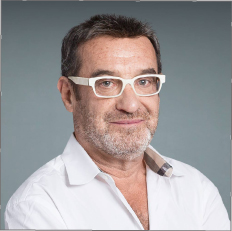 The 2022 featured speaker is Danny Reinberg, PHD, Terry and Mel Karmazin Professor of Biochemistry and Molecular Pharmacology, in the Department of Biochemistry and Molecular Pharmacology at New York University School of Medicine. Dr. Reinberg’s research focuses on such areas as transcription factors, genetic transcription, histones, RNA Polymerase II, and Chromatin. Reinberg was born in Santiago, Chile in 1954. Reinberg's higher education includes the Catholic University in Valparaiso, Chile.
The 2022 featured speaker is Danny Reinberg, PHD, Terry and Mel Karmazin Professor of Biochemistry and Molecular Pharmacology, in the Department of Biochemistry and Molecular Pharmacology at New York University School of Medicine. Dr. Reinberg’s research focuses on such areas as transcription factors, genetic transcription, histones, RNA Polymerase II, and Chromatin. Reinberg was born in Santiago, Chile in 1954. Reinberg's higher education includes the Catholic University in Valparaiso, Chile.
Click to read more about Dr. Reinberg's work.
INNOVATION - Dr. Tony Hu featured in the Winter 2022 issue of The Tulanian.
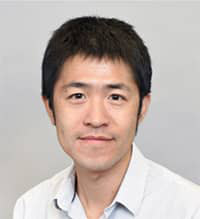 Congratulations to Dr. Bo Ning, promotion to Assistant Professor with tenure in the Department of Biochemistry and Molecular Biology, effective January 1st, 2022.
Congratulations to Dr. Bo Ning, promotion to Assistant Professor with tenure in the Department of Biochemistry and Molecular Biology, effective January 1st, 2022.
SAVE THE DATE - FRIDAY, APRIL 22, 2022
George A Adrouny Memorial Lectureship
10:00am US Daylight Savings Time
In person an via Zoom
Danny Reinberg, PhD
Terry and Mel Karmazin Professor of Biochemistry and Molecular Pharmacology
New York University of Medicine
New York, New York
More information coming. For the latest, contact Kelly Ragland Boyd at kraglan@tulane.edu
Li named National Academy of Inventors Fellow
Chenzhong Li, professor of biomedical engineering and biochemistry at the School of Medicine and the School of Science and Engineering, has been named a 2021 fellow by the National Academy of Inventors. Read about this honor.
(1/5/22)
$3.1 Million NCI Grant Supports Development of Potential Blood Test for Pancreatic Cancer
Read more about Dr. Tony Hu in the Tulane Cancer Center News.
(12/17/21)
Masters Students
Fall/Spring 2021/22
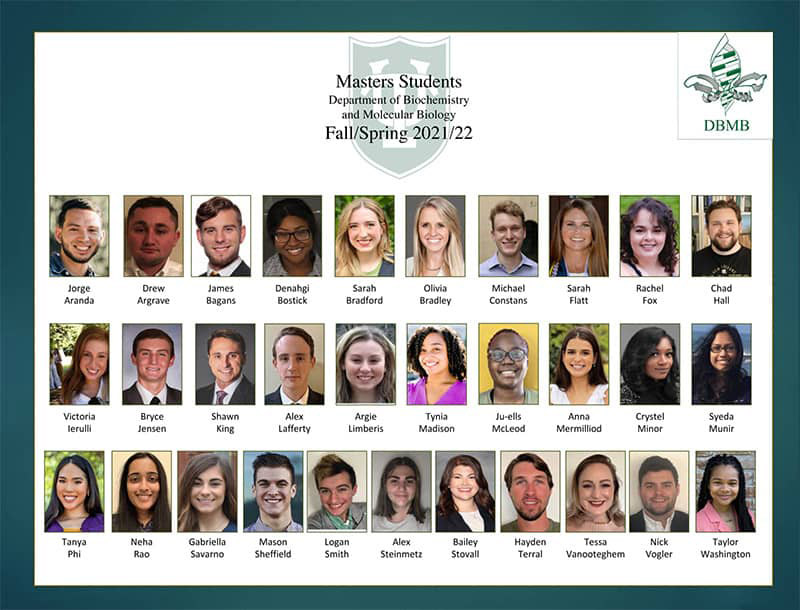
7th Annual Scientific Departmental (Virtual) Retreat
August 13, 2021
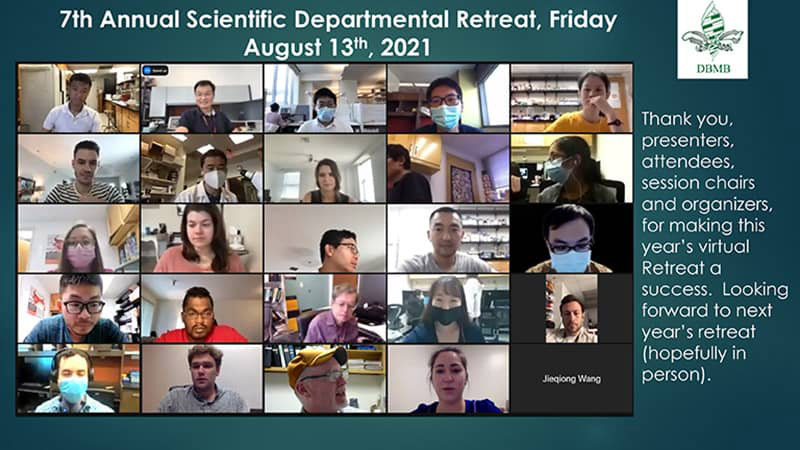
August 5th, 2021 Tulane News features Dr. Tony Hu ("Tulane researchers design nanotechnology blood test to find hidden COVID-19 infections"):
Important new Nature nano paper from Dr. Tony Hu and Team, published online:
https://www.nature.com/articles/s41565-021-00939-8
Career Conversations:
Q&A with Molecular Biologist Hong Liu – Biomedical Beat Blog – National Institute of General Medical Sciences -- Click Here
ASPIRE Summer Research Buddy Program, 2021
In collaboration with the Newcomb-Tulane College’s Office of Academic Enrichment, Tulane School of Medicine has developed a new outreach program for Summer 2021 to specifically address the underrepresentation of students of color in the medical field. The ASPIRE Summer Research Buddies will assist medical students conducting research in the ASPIRE program, and will also provide our medical students with supervisory experience. The program funds three talented Tulane undergraduates, who are paired with a current medical student/mentor from this year’s ASPIRE program.
Dr. Lu and his lab were matched this year with Adhithi Sreenivasan. She is interested in the relationship of cancer to neurobiology. As a rising sophomore, Adhithi will receive lab-based experience while assisting 2nd year medical student Alyssa Webster. We are confident that both students will benefit from this program through mentorship, collaboration, and research exposure.
Congratulations to Adhithi, and we look forward to seeing her in the halls of the department.
New Grant Funding in the Department
First Half of 2021
Any new funding not reported here will be provided in our next update
- James Jackson (NIH R01) Genotoxic Stress Response and Mutagenesis in Normal Tissues of Mice Deficient in Homology Directed Repair, April 2021-January 2026
- Jun-Yuan Ji (Mike Slive Foundation) Functions of the CDK8 Module in Prostate Cancer Cells, March 2021-March 2022
- Jun-Yuan Ji (NIH R01) Role of alpha-catenin and Wnt signaling in regulating lipid homeostasis, March 2021-August 2022
- Jun-Yuan Ji (NIH R01) Role of alpha-catenin and Wnt signaling in regulating lipid homeostasis (Supplement), March 2021-August 2022
- Jun-Yuan Ji (NIH R01) Context-specific Functions of CDK8, March 2021-Januray 2024
- Hong Liu (NIH R01) Functions and Regulation of Centromeric Transcription, May 2021-April 2025
- Christopher Lyon (NIH) Mtb and HIV/SIV antigen peptide signatures as blood biomarkers to detect early infection to active disease in young children and NHP (Sub award), May 2021-March 2026
- Christopher Lyon (NIH) Direct quantitation of the circulating Mtb-peptidome for pediatric TB management, March 2021-February 2022
- Aiguo Tian (NIH) Mentoring Research Excellence in Aging and Regenerative Medicine COBRE - Admin Core, January 2021-May 2021
- Aiguo Tian (NIH) Mentoring Research Excellence in Aging and Regenerative Medicine COBRE - Admin Core, June 2021-May 2022
- William Wimley (NIH R21) Mechanism of Resistance Avoidance in Synthetically Evolved Antibacterial Peptides, June 2021-May 2023
- Yiwei Zhang (School of Medicine Pilot Funds) Role of p53-IMP2 axis in adipocyte browning, March 2021
Other Faculty News
Heather Machado
Grant Submissions
1R21HD102657-01 Stromal regulation of mammary gland ECM homeostasis during pregnancy (June 2022).
1R01HD106929-01 Functions of ductal- and stromal-associated macrophages in the mammary gland (Feb. 2022).
William Wimley
Grant Submissions
Collabborative R21 proposal to NIGMS
STTR/R41 proposal to NIAID
Note: Submitted two pre-proposals to the Department of Defense Peer Reviewed Medical Research Program 2021.
Grant reviewer
Continued service on the Biochemistry/Biophysics fellowship (F30,F31,F32) panel for NIH.
Seminars
Invited speaker at the virtual Spring Meeting of the American Chemical Society.
Service
Editorial Board Member: BBA-Biomembranes and Journal of Membrane Biology.
Hua Lu
Invited talks
Invited distinguished seminar online, 100th Anniversary of Nanchang University-Jiangxi School of Medicine, Nanchang, Jiangxi Province, China (May 2021).
Department of Cancer Biology, University of Toledo School of Medicine, Toledo, OH, USA (May 2021).
Department of Integrative Biology and Pharmacology, UT Health McGovern School of Medicine, Houston, TX 77030, USA (April 2021).
JMCB, Associate Editor; Topic Editor, Frontiers in Cell and Developmental Biology (open access), 2021-2022.3; Associate Editor, Genes & Diseases, Elsevier B.V. press. 2019-present; Ad hoc reviewers for more than 2 dozes of journals including Theranositc, PNAS, Cancer Research, eLIFE, Cell Death and Differentiation, Nucleic Acid Research, Oncogene, Cell Death & Disease, Cell Reports, Molecular Cell, JBC, Molecular Cancer Research, Cell Cycle, BMC Mol Cell Biol, BMS, FEBB Letters, Frontiers, Life Science Appliance, Science China, Signal Transduction and Targeted Therapy, etc.
NIH Study Section
NIH DMP study section-standing member.
Teaching
Co-director of the Medical Grand-Round Course.
Other Service
Advisory board member for ACP (Association for Chinese Professor)-Tulane chapter New Orleans, LA (2021).
La CaTS Roadmap Fellow Applications Review Committee, New Orleans, LA (2021).
The Charity Hospital Project Plan Prereview Committee, Tulane University School of Medicine, New Orleans, LA (2021).
Diane Blake
Abstracts
Zhang, Z., Lim, L., Gilbert, C., Fan, J., Sahiner, N., Blake D., Ayyala R.S. Antimicrobial activity and biocompatibility of a hyaluronic acid-ciprofloxacin polymer. ARVO 2021, virtual, May 11, 2021.
Ayyala, R.S., Freer, K., Fullerton, M.L., Blake, D.A. Optimizing drug release in sterilized drug delivery devices to prevent post-operative fibrosis. ARVO 2021, virtual May 12, 2021.
Patent
Blake, D.A., Sun, Y. PAH Antibodies and Uses Thereof. US Patent No. 11029303, June 8, 2021.
Tony Hu
Medicine Grand Rounds, “A Golden Touch by Small Particles,” June 2nd.
Arthur Lustig
Professional Activity
Telomere Research Network Working Committee on Aging and Telomeres
Journal Reviewer
Nucleic Acids Res., Cancers (Basel), Int. Journal of Med Sci, Nature Communications
Academic Editor Special Issues Editor
PLOS One Micro-organisms
Congratulations to Dr. Hong Liu and his Team. Lu Yang, Qian Zhang, Tianhua Niu, and Hong Liu (2021) SET Levels Contribute to Cohesion. MBoC 28 Apr 2021 https://doi.org/10.1091/mbc.E20-12-0778
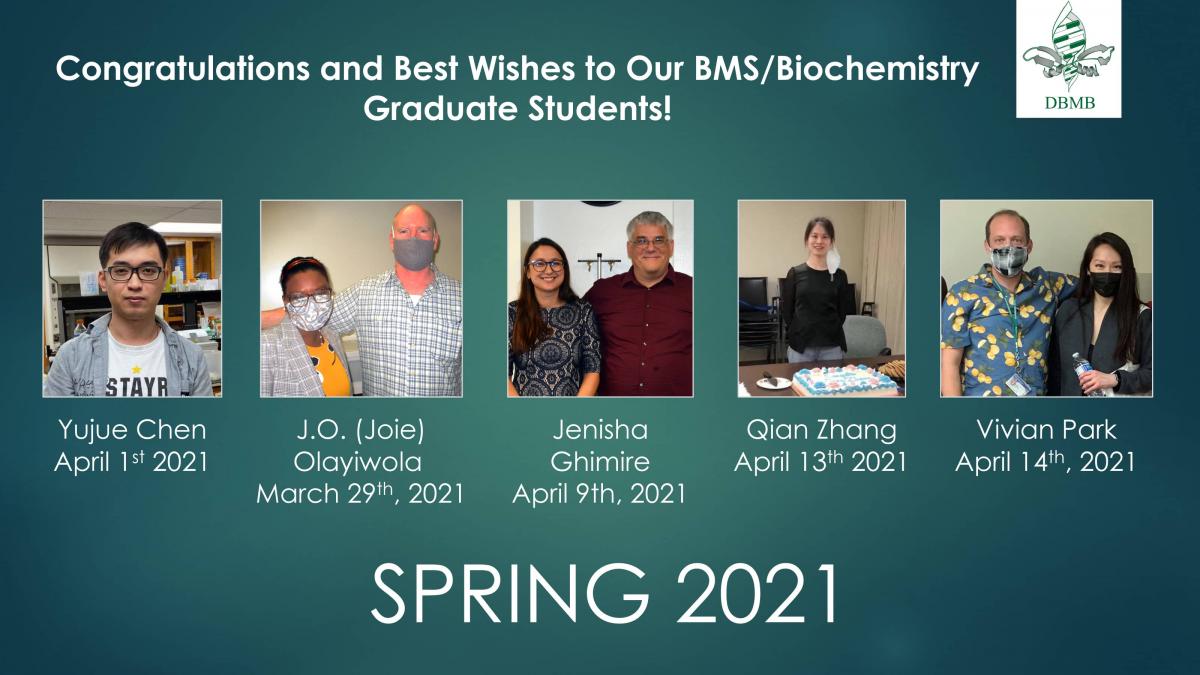
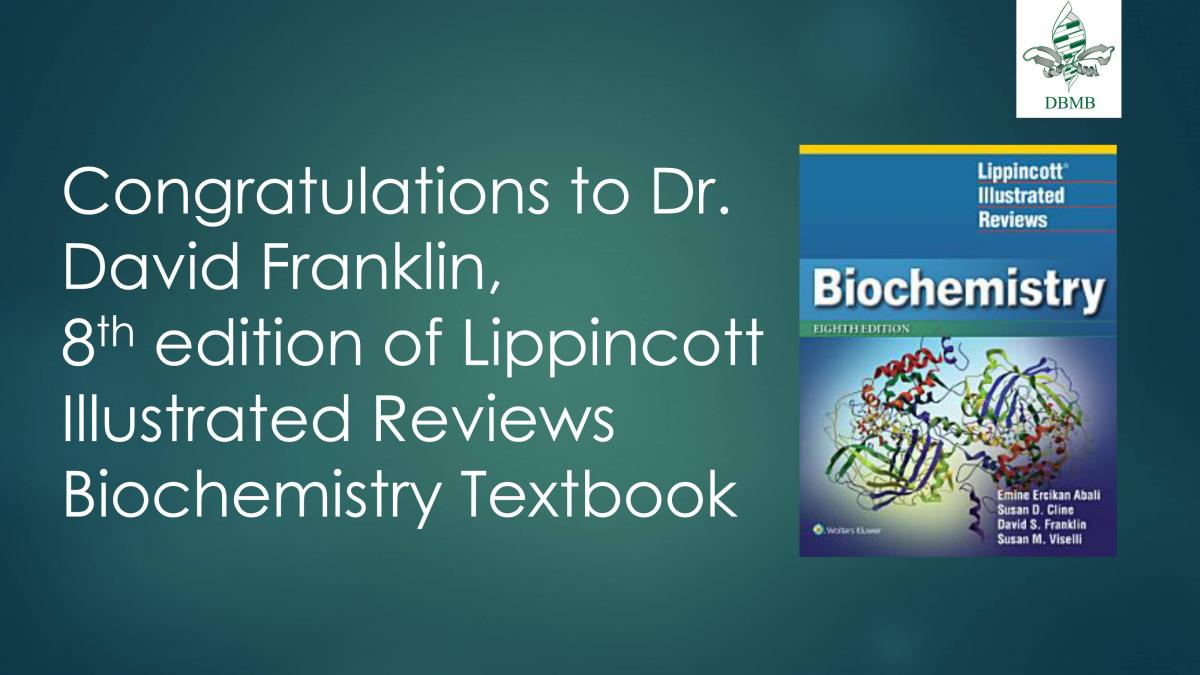
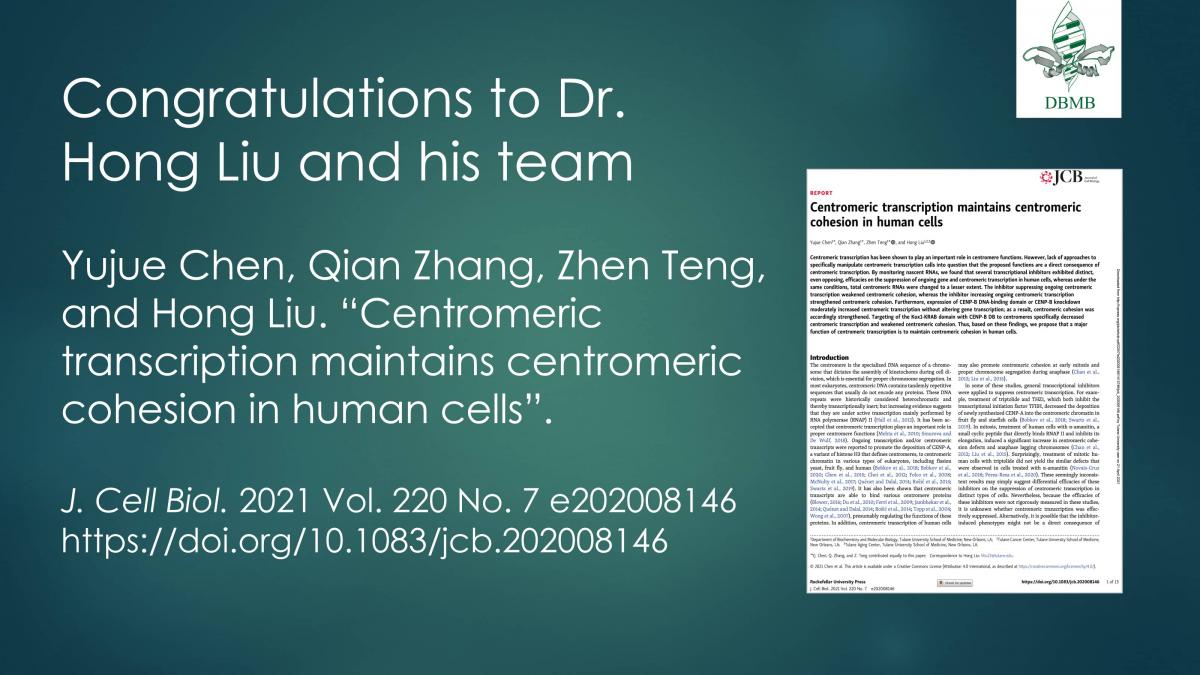
Congratulations to Dr. Hong Liu and his team on their new NIH R01 grant funding (posted 4/1/21)
Functions and Regulation of Centromeric Transcription
Abstract: The human "centromere" contains non-coding satellite DNA sequences, and its transcription is critical for maintaining chromosome stability, but its exact role remains elusive. This grant is to study how centromeric transcription promotes chromosome stability and how it is regulated.
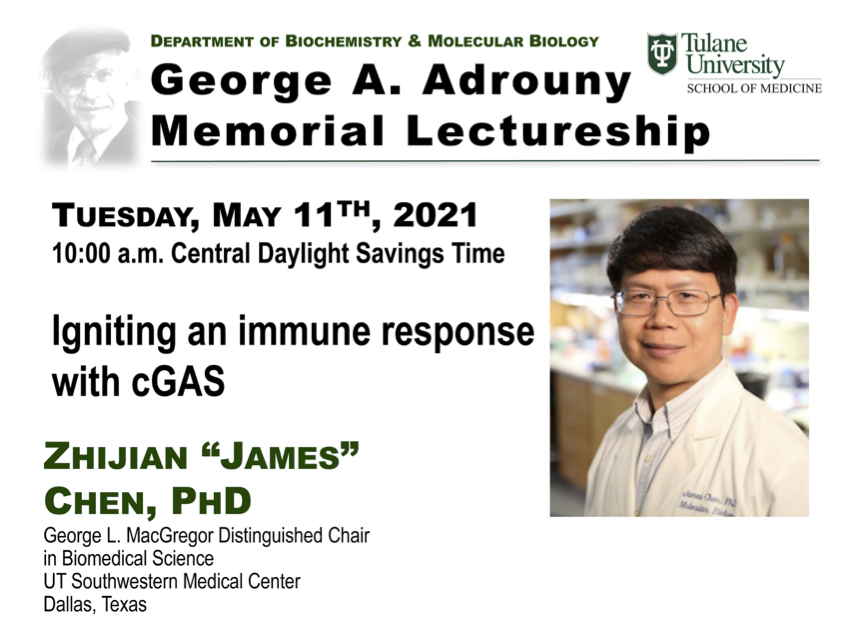
WELCOME NEW STAFF

Andrea Fitte is the new Administrative Operations Manager for the Department of Biochemistry and Molecular Biology. She joined the Tulane family in July of 2018 working with Tulane University Medical Group. She was the Manager of Clinic Information & Process Training for the Tulane Doctors Medical Clinics.
Andrea obtained a BS in Health Information Management from Louisiana Tech University, an MBA from Louisiana State University Shreveport and holds a current Registered Health Information Administrator certification. She’s also an active member of the American Health Information Management Association, the Healthcare Information and Management Systems Society and Alpha Kappa Alpha Sorority, Inc.
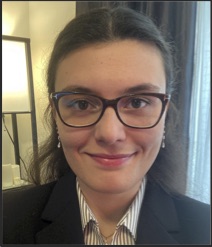
Mariana A. Muravitsky was born in Moldova, grew up in Brooklyn, NY, and graduated from Tulane University with a BA in Cognitive Studies and English and a minor in Russian in 2011. She gained professional experience in language services, social services, and legal and academic administration in New York City before returning to New Orleans and accepting the Project Assistant position in the Tulane Department of Chemical and Biomolecular Engineering in 2018. She is excited to take on new challenges at Tulane now as Senior Executive Secretary to Dr. Tony Hu.
In her free time, Mariana enjoys running, writing, reading (especially about theology and psychology), and spending time with friends and family. Mariana will be getting married this April and afterwards will be called Mariana Cercena.
WELCOME NEW FACULTY
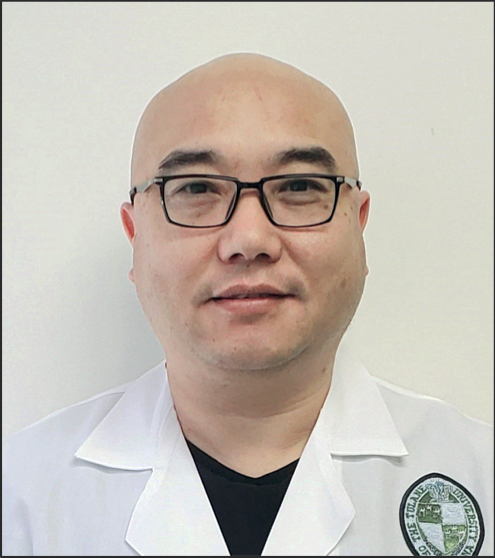
The Department of Biochemistry and Molecular Biology welcomes Dr. Chenzhong Li to the ranks of new faculty in the department, with an appointment as Professor of Biochemistry and Molecular Biology on the research track, the Center of Cellular and Molecular Diagnosis. Dr. Li comes to Tulane from the Florida International University in Miami, where he was Professor of Biomedical Engineering and Director of the Nanobioengineering/Biosensors Lab.
Dr. Li is an expert in bioinstrumentation, specifically in the development of biomedical devices for both diagnostic and therapeutic, which could have cross-applications for environmental, food safety monitoring, and homeland security. His team has successfully developed several POCT and organ on chip based sensing platforms for early diagnosis of cancer, Alzheimer's disease, infectious disease, and environmental exposure assessment.
Dr. Li has more than 20 years of working experience as a researcher, professor, entrepreneur, and a government funding program director. With previous working experience in all sectors including industry, government labs and academia, he is in an excellent position to understand each system’s language and priorities. This will aid him to build a strong link between Tulane, government agencies, and high-tech industries.
“I am thrilled to make use of all my experience and working with new teammates here at Tulane,” Dr. Li said.
Please welcome Dr. Chenzhong Li to our Tulane Community.
Published Articles by our Faculty – January 1st-March 31st, 2021
Bejarano, F., Chang, C.H., Sun, K., Hagen, J.W., Deng, W.M., and Lai, E.C. (2021) A comprehensive in vivo screen for anti-apoptotic miRNAs indicates broad capacities for oncogenic synergy. Dev Biol. 2021 Mar 1;475:10-20. doi: 10.1016/j.ydbio.2021.02.010. Online ahead of print. PMID: 33662357
_______________________________________________________________
Gong, S., Zhang, Y., Bao, H., Wang, X., Chang, C.H., Huang, Y.C., and Deng, W.M. (2021) Tumor Allotransplantation in Drosophila melanogaster with a Programmable Auto-Nanoliter Injector. J Vis Exp. 2021 Feb 2;(168). doi: 10.3791/62229. PMID: 33616117
_______________________________________________________________
Row, S, Huang, Y.C., and Deng, W.M. (2021) Developmental regulation of oocyte lipid intake through ‘patent’ follicular epithelium in Drosophila melanogaster. iScience Apr. 2021 23;24, 4, doi.org/10.1016/j.isci.2021.102275
_______________________________________________________________
Beddingfield, B.J., Iwanaga, N., Chapagain, P.P., Zheng, W., Roy, C.J., Hu, T.Y., Kolls, J.K., and Bix, G.J. (2021) The Integrin Binding Peptide, ATN-161, as a Novel Therapy for SARS-CoV-2 Infection. JACC Basic Transl Sci. 2021 Jan;6(1):1-8. doi: 10.1016/j.jacbts.2020.10.003.
_______________________________________________________________
Jain, S., Nehra, M., Kumar, R., Dilbaghi, N., Hu, T.Y., Kumar, S., Kaushik, A., and Li, C. (2021) Internet of medical things (IoMT)-integrated biosensors for point-of-care testing of infectious diseases. Biosens Bioelectron., doi: 10.1016/j.bios.2021.113074. Epub 2021 Feb 6.
_______________________________________________________________
He, Y., Lyon, C.J., Nguyen, D.T., Liu, C., Sha, W., Graviss, E.A., and Hu, T.Y. (2021) Serum-Based Diagnosis of Pediatric Tuberculosis by Assay of Mycobacterium tuberculosis Factors: a Retrospective Cohort Study. J Clin Microbiol. 2021 Jan 21;59(2):e01756-20. doi: 10.1128/JCM.01756-20. Print 2021 Jan 21.
_______________________________________________________________
Ning, B., Yu, T., Zhang, S., Huang, Z., Tian, D., Lin, Z., Niu, A., Golden, N., Hensley, K., Threaten, B., Lyon, C.J., Yin, X.M., Roy, C.J., Saba, N.S., Rapport, J., Wei, Q., and Hu, T.Y. (2021) A smartphone-read ultrasensitive and quantitative saliva test for COVID-19. Sci Adv. 2021 Jan 8;7(2):eabe3703. doi: 10.1126/sciadv.abe3703. Print 2021 Jan.
_______________________________________________________________
Huang, Z., Ning, N., Yang, H.S., Youngquist, B.M., Niu, A., Lyon, C.J., Beddingfield, B.J., Fears, A.C., Monk, C.H., Murrell, A.E., Bilton, S.J., Linhuber, J.P., Norton, E.B., Dietrich, M.L., Yee, J.K., Lai, W., Scott, J.W., Yin, W.M., Rappaport, J., Robinson, J.E., Saba, N.S., Roy, C.J., Zwezdaryk, K.J., Zhao, Z., and Hu, T.Y. (2021) Sensitive tracking of circulating viral RNA through all stages of SARS-CoV-2 infection. J Clin Invest. 2021 Feb 9;146031. doi: 10.1172/JCI146031. Online ahead of print.
_______________________________________________________________
Sun, D., Zhao, Z., Spiegel, S., Liu, Y., Fan, J., Amrollahi, P., Hu, J., Lyon, C.J., Wan, M., and Hu, T.Y. (2021) Dye-free spectrophotometric measurement of nucleic acid-to-protein ratio for cell-selective extracellular vesicle discrimination. Biosens Bioelectron. 2021 May 1;179:113058. doi: 10.1016/j.bios.2021.113058. Epub 2021 Feb 9.
_______________________________________________________________
Hao, Q., Chen, J., Liao, J., Huang, Y., Larisch, S., Zeng, S.X., Lu, H., and Zhou, X. (2021) p53 induces SEPT4/ARTS as a positive feedback regulator in mitochondrial apoptosis. Cell Death & Disease. 12, 204.
_______________________________________________________________
Yan, Z., Cheng, M., Hu, G., Wang, Y., Zeng, S., Huang, A., Shi, C., Deng, L., Rao, H., Lu, H., Chen, Y., and Luo, S. (2021) Positive feedback of SuFu negating protein 1 to Hedgehog signaling promotes colorectal tumorigenesis. Cell Death & Disease. 12, 199.
_______________________________________________________________
Wang, S.S., Hao, Q., Li, J.J., Chen, Y.J., Lu, H., Wu, X.H., and Zhou, X. (2021) Ubiquitin ligase DRX3 empowers mutant p53 to promote ovarian cancer development. Genes & Diseases. In press.
_______________________________________________________________
Chen, C.H., Starr, C.G., Guha, S., Wimley, W.C., Ulmschneider, M.B., and Ulmschneider, J.P. (2021) Tuning of a Membrane-Perforating Antimicrobial Peptide to Selectively Target Membranes of Different Lipid Composition. J Membr Biol. 2021 Feb;254(1):75-96. doi: 10.1007/s00232-021-00174-1. Epub 2021 Feb 10.PMID: 33564914
_______________________________________________________________
Kim, S.Y., Bondar, A.N., Wimley, W.C., and Hristova, K. (2021) pH-triggered pore-forming peptides with strong composition-dependent membrane selectivity. Biophys J. 2021 Feb 16;120(4):618-630. doi: 10.1016/j.bpj.2021.01.010. Epub 2021 Jan 16.PMID: 33460594
From Tulane News
Tulane develops test that can detect COVID-19 that nasal swabs miss
February 26, 2021 8:30 AM
Carolyn Scofield cscofiel@tulane.edu
Tulane University researchers have developed a highly sensitive blood test that can detect COVID-19 in rare cases when infections were missed by nasal swab PCR tests.
The research results were published in the Journal of Clinical Investigation.
Most PCR-based COVID-19 tests use nasal swabs because the virus actively replicates in the upper respiratory tract immediately after infection. However, virus levels in the nose wane through the course of infection. Studies have shown that the virus can be detected in blood and blood viral levels can indicate disease severity, but PCR tests aren’t sensitive enough for reliable blood screening.
Tony Hu, Weatherhead Presidential Chair in Biotechnology Innovation at Tulane University School of Medicine, developed a test that solves the issue using CRISPR gene-editing technology. His test amplifies a genetic fragment of the SARS-CoV-2 virus, similar to conventional testing assays, but then uses CRISPR to greatly amplify the signal produced in response to this target DNA region.
The test could be especially useful in clinical applications where patients may be presenting with severe symptoms of COVID-19 but consistently test negative for the disease using nasal swab PCR tests, Hu said.
“This approach could not only improve the accuracy of COVID-19 diagnoses but it may also help doctors predict the severity of infection and whether patients have fully cleared the virus,” Hu said.
Using a nonhuman primate model of asymptomatic COVID-19, Hu and his team compared the new test with PCR tests immediately after infection. SARS-CoV-2 RNA was detectable in plasma from the first day after virus exposure and remained high thereafter, unlike nasal swab levels, which steadily declined after infection.
Hu and his team also used the plasma test to screen blood samples from patients.
They detected virus RNA in 32 of 34 samples collected from symptomatic COVID-19 patients who had positive nasal swab PCR tests (91% sensitivity) and did not detect virus RNA in 124 of the 125 samples collected before the pandemic (99% specificity). PCR-based screening, however, detected virus RNA in only 44% of the blood samples from the COVID-19 patients.
Researchers also evaluated the test on samples from children and a small cohort of cancer patients. In a group of 32 children screened for COVID-19, the CRISPR-based test found three infections missed by nasal swab PCR tests. These cases were later confirmed by antibody testing. Researchers tested samples from five patients with a history of leukemia who exhibited COVID-19 symptoms, but whose nasal swab PCR tests results were negative. The CRISPR test detected COVID-19 in four of these patients.
Tulane researchers also found that COVID-19 patients who had the most serious symptoms had the highest levels of virus RNA in their blood. Understanding more about the virus can lead to better treatments for patients, Hu said.
Welcome New Faculty
Tulane University School of Medicine and the Department of Biochemistry and Molecular Biology are pleased to announce that Dr. Jun-Yuan Ji, currently at Texas A&M University, will join the department in March 2021 as a Full Professor.
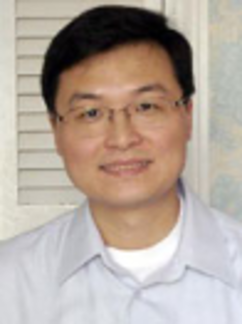 Dr. Ji is a developmental geneticist with research interests in cancer biology. He and his laboratory have made several important contributions to understanding transcriptional regulation of lipid metabolism and cell-cycle processes using Drosophila and cultured cancer cells as experimental systems. His active research programs have been well funded with several grants from NIH and AHA. He has contributed to a number of high quality publications in peer-reviewed journals, such as Nature, Nature Cell Biology, Genes & Development, Nature Communications, PNAS, PLoS Biology, PLoS Genetics, Journal of Clinical Investigation, and Development, Genetics. He has received several awards including the AHA NCRP Spring 2011 Scientist Development award and served as a reviewer for a number of scientific journals and federal and private funding agents. He is one of the most highly recognized scientists in the fields of cancer signaling and developmental genetics using Drosophila as a model system.
Dr. Ji is a developmental geneticist with research interests in cancer biology. He and his laboratory have made several important contributions to understanding transcriptional regulation of lipid metabolism and cell-cycle processes using Drosophila and cultured cancer cells as experimental systems. His active research programs have been well funded with several grants from NIH and AHA. He has contributed to a number of high quality publications in peer-reviewed journals, such as Nature, Nature Cell Biology, Genes & Development, Nature Communications, PNAS, PLoS Biology, PLoS Genetics, Journal of Clinical Investigation, and Development, Genetics. He has received several awards including the AHA NCRP Spring 2011 Scientist Development award and served as a reviewer for a number of scientific journals and federal and private funding agents. He is one of the most highly recognized scientists in the fields of cancer signaling and developmental genetics using Drosophila as a model system.
Dr. Ji graduated from Lanzhou University with a bachelor's degree in Cell Biology in 1994, and then obtained a master's degree in Developmental Biology from the Institute of Genetics and Developmental Biology at the Chinese Academy of Sciences in Beijing. After obtaining his Ph.D. degree in Zoology from the University of Washington in 2003 under the tutelage of Professor Gerold Schubiger, he pursued his postdoctoral research in Professor Nicholas Dyson’s laboratory at Massachusetts General Hospital Cancer Center. In 2009, Dr. Ji joined the College of Medicine, Texas A&M University Health Science Center as an Assistant Professor on the Tenure Track, and he was promoted to Associate Professor with tenure in 2015.
We welcome Dr. Jun-Yuan Ji to our growing number of highly accomplished researchers at Tulane School of Medicine.
Funding in the Center of Cellular and Molecular Diagnostics
DOD, Qualification of Circulating Mtb Antigens for Rapid TB Diagnosis and Treatment Monitoring, 29-Sep-19 29-Sep-22, $1,300,987
NIH (R21), Mobile based Nanoplasmonice Quantification of Mtb-derived Exosomes in Serum for Pediatric TB diagnosis, 18-Sep-19 31-Jul-21, $179,885
UCSD/NIH UCSD (R01) Y2, Identifying Individuals at Risk of Progression to Active Tuberculosis, 1-Feb-20 31-Jan-21, $15,450
UWashington/NIH Sub/U Wash NanoDisk Y2, NanoDisk-MS measured Mtb antigen peptides for TB diagnosis and treatment monitoringin HIV-infected children, 1-Mar-20 28-Feb-21, $95,675
UCSD/NIH UCSD (R01, An Antigen-Detection Blood Test for Tuberculosis 1-Jul-20 30-Jun-21, $158,661
NIH (U01), Digital Nanoplasmonic Quantification of Tumor-derived Extracellular Vesicles in Plasma Microsamples, 25-Sep-20 31-Aug-21, $630,597
U Penn/Bill & Melinda Gates Foundation, Accelerating Bovine Tuberculosis Control in Developing Countries (DFID-DF), 1-Nov-20 1-Nov-21, $110,000
2020 Synergy Awards, Presented December 14th, 2020
In recognition of best research paper contributed by a graduate student in the department
Karl Hodel
Karl P Hodel, Meijuan J S Sun, Nathan Ungerleider, Vivian S, Park, Leonard G Williams, David L Bauer, Victoria E Immethun, Jieqiong Wang, Zucai Suo, Hua Lu, James B McLachlan, Zachary F Pursell. POLE Mutation Spectra Are Shaped by the Mutant Allele Identity, Its Abundance, and Mismatch Repair Status. Mol Cell. 2020 Jun 18;78(6):1166-1177.e6. doi: 10.1016/j.molcel.2020.05.012. Epub 2020 Jun 3.
In recognition of best research paper contributed by a postdoc or junior non-faculty research scientist in the department
Ji Hoon Jung
Ji Hoon Jung, Hyemin Lee, Bo Cao, Peng Liao, Shelya X Zeng, Hua Lu. RNA-binding motif protein 10 induces apoptosis and suppresses proliferation by activating p53. Oncogene. 2020 Jan;39(5):1031-1040. doi: 10.1038/s41388-019-1034-9. Epub 2019 Oct 7.
Jim & Betty Karam Postdoctoral Training Endowed Fund
Congratulations to Diana Stafa (Han Lab).
Quoc C. Le MD, PhD Memorial Award 2020
Congratulations to Emma Newton (Machado lab).
In recognition of outstanding services offered by a member of the administrative staff in the department
Congratulations to Jill Barbay and Gilbert Estrada.
Special Award for Outstanding Service During the COVID-19/Coronavirus Pandemic
Congratulations to Tetyana Antoshchenko.
MILESTONE
Congratulations to Jill Barbay for 30 Years of Service to Tulane.
2020 President’s Excellence Awards
Congratulations to Jill Barbay and Laurie Miester, Team Award Recipients, School of Medicine Administrators Category.
Selected Recent Publications from our Faculty and their Teams, period of September 1st-December 31st, 2020
Wang, Y., Chaffee, T.S., LaRue, R.S., Huggins, D.N., Witschen, P.M., Ibrahim, A.M., Nelson, A.C., Machado, H.L., and Schwertfeger, K.L. (2020) Tissue resident macrophages promote extracellular matrix homeostasis in the mammary gland stroma of nulliparous mice. Elife; 9:e57438. (PMID: 32479261
Ibrahim, A.M., Moss, M.A., Gray, Z., Rojo, M.D., Burke, C.M., Schwertfeger, K.L., Dos Santos, C.O., and Machado, H.L. (2020) Diverse macrophage populations contribute to the inflammatory microenvironment in premalignant lesions during localized invasion. Frontiers in Oncology; 10:569985 (PMID: 33072601; PMC7541939)
Fenton, A., Elliott, E., Shahbandi, A., Ezenwa, E., Morris, C., McLawhorn, J., Jackson, J.G., Allen, P., and Murina, A. (2020) Medical students' ability to diagnose common dermatologic conditions in skin of color. J Am Acad Dermatol. 2020 Sep;83(3):957-958. doi: 10.1016/j.jaad.2019.12.078. Epub 2020 Feb 1.PMID: 32017947 Free PMC article.
Shahbandi, A., Rao, S.G., Anderson, A.Y., Frey, W.D., Olayiwola, J.O., Ungerleider, N.A., and Jackson, J.G. (2020) BH3 mimetics selectively eliminate chemotherapy-induced senescent cells and improve response in TP53 wild-type breast cancer. Cell Death Differ. 2020 Nov;27(11):3097-3116. doi: 10.1038/s41418-020-0564-6. Epub 2020 May 26. PMID: 32457483 Free PMC articlee.
Liu, Y., Gu, Y., Lyon, C. J., Fan, J., Koay, E., Katz, M., Han, H., Von Hoff, D., and Hu, T. (2020) Circulating levels of hydroxylated bradykinin function as an indicator of tissue HIF-1α expression. Science Bulletin. 2020,65(18): 1570-1579.
Hu, T., Walfrom, J. E., Srivastava, S. (2020) Extracellular Vesicles in Cancer Detection: Hopes and Hypes. Cell: Trends in Cancer. 2020, in press.
Huang, Z., Tian, D., Liu, Y., Lin, Z., Lyon, C., J., Lai, W., Fusco, D., Drouin, A., Yin, X., Hu, T., and Ning, B. (2020) Ultra-Sensitive High Throughput CRISPR
Diagnosis of COVID-19. Biosensors and Bioelectronics. 164:112316. [doi: 10.1016/ j.bios.2020.112316.]
He, Y., Lyon, C. J., Nguyen D. T., Liu, C., Sha, W., Graviss, E., and Hu, T. (2020) Serum-based diagnosis of pediatric tuberculosis by assay of Mycobacterium tuberculosis factors: a retrospective cohort study. J. Clin. Micro. (accepted).
Ning, B., Yu, T., Zhang, S., Huang Z, Tian D, Lin Z, Niu A, Golden N, Hensley K, Threeton B, Lyon CJ, Yin XM, Roy CH, Saba NS, Rappaport J, Wie Q, and Hu T.Y. (2020) A smartphone-read ultrasensitive and quantitative saliva test for COVID-19. Science Advances (accepted).
Galati, M.A., Hodel, K.P., Gams, M.S., Sudhaman, S., Bridge, T., Zahurancik, W.J., Ungerleider, N.A., Park, V.S., Ercan, A.B., Joksimovic, L., Siddiqui, I , Siddaway, R., Edwards, M., de Borja, R., Elshaher D., Chung, J., Forster, V.J., Nunes, N.M,. Aronson, M., Wang, X., Ramdas, J., Seeley, A., Sarosiek, T., Dunn, G.P., Byrd, J.N., Mordechai, O., Durno, C., Martin, A., Sylien A., Bouffet, E., Suo, Z., Jackson, J.G., Hawkins, C.E., Guidos, C.J., Purcell, Z.F., and Tabori, U. (2020) Cancers from novel Pole mutant mouse models provide insights into polymerase-mediated hypermutagenesis and immune checkpoint blockade. Cancer Res. 2020 Sep 16:canres.0624.2020. doi: 10.1158/0008-5472.CAN-20-0624. Online ahead of print. PMID: 32938641
Chung, J., Maruvka, Y., Subhuman, S., Kelly, J., Haradhvala, N., Bianchi, V., Edwards, M., Forster, V., Nunes, N., Galati, M., Kommas, M., Deshmukh, S., Cabric, V., Davidson, S., Zatzman, M., Light, N., Hayes, R., Brunch, M., Anderson, N., Ho, B., Hodel, K., Siddaway, R., Morrissy, A.S., Bowers, D., Larouche, V., Bronsema, A., Osborn, M., Cole, K., Opocher, E., Mason, G., Thomas, G., George, B., Ziegler, D., Lindhorst, S., Vanan, M., Yalon-Oren, M., Reddy, A., Massimino, M., Tomboc, P., Van Damme, A., Lossos, A., Durno, C., Aronson, M., Morgenstern, D., Bouffet, E., Huang, A., Taylor, M., Villani, A., Malkin, D., Hawkins, C., Purcell, Z.F., Saline, A., Dunkel, T., Getz, G., and Tabori, U. (2020) DNA polymerase and mismatch repair exert distinct microsatellite instability signatures in normal and malignant human cells. Cancer Discovery. 2020, in press.
Hoffmann, A.R., Guha, S., Wu, E., Grimier, J., Wang, Y., He, J., Garry, R.F., and Wimley, W.C. (2020) Broad-Spectrum Antiviral Entry Inhibition by Interfacially Active Peptides. J Virol. 2020 Nov 9;94(23):e01682-20. doi: 10.1128/JVI.01682-20.
Wu, E., Henschke, R.M., Hristova, K., and Wimley, W.C. (2020) Rational Modulation of pH-Triggered Macromolecular Poration by Peptide Acylation and Dimerization. J Phys Chem B. 2020 Oct 8;124(40):8835-8843. doi:10.1021/acs.jpcb.0c05363.
Liang, H., Wang, Q., Wang, D., Zheng, H., Valvakolanu, D.V., Lu, H., Wen, N., Chen, X., Xu, L., Ren, J., Guo, B., and Zhang, L. (2020) RGFP966, a Histone deacetylase 3 inhibitor, promotes glioma stem cell differentiation by blocking TGFbeta signaling via SMAD7. Biochemical Pharmacology. 114118. doi: 10.1016/j.bcp.2020.114118. Online ahead of print. PMID: 32585142.
Jung, J.H., Lee, H.M., Zeng, S.X., and Lu H. (2020) RBM10: A new regulator of p53. Cells. Invited review. 9, E2107. PMID: 32947864.
Roy, K.R., Uddin, M.B., Roy, S.C., Hill, R.A., Marshall, J., Li, Y.T., Chamcheu, J.C., Lu, H., and Liu, Y.Y. (2020) Gb3-cSrc complex in glycosphingolipid-enriched microdomains attributes to the expression of p53 mutant protein and cancer drug resistance via beta-catenin activated RNA-methylation. FASEB BioAdvances. In press.
Wang, S.S., Hao, Q., Li, J.J., Chen, Y.J., Lu, H., Wu, X.H., and Zhou, X. (2020) Ubiquitin ligase DRX3 empowers mutant p53 to promote ovarian cancer development. Genes & Diseases. In press.
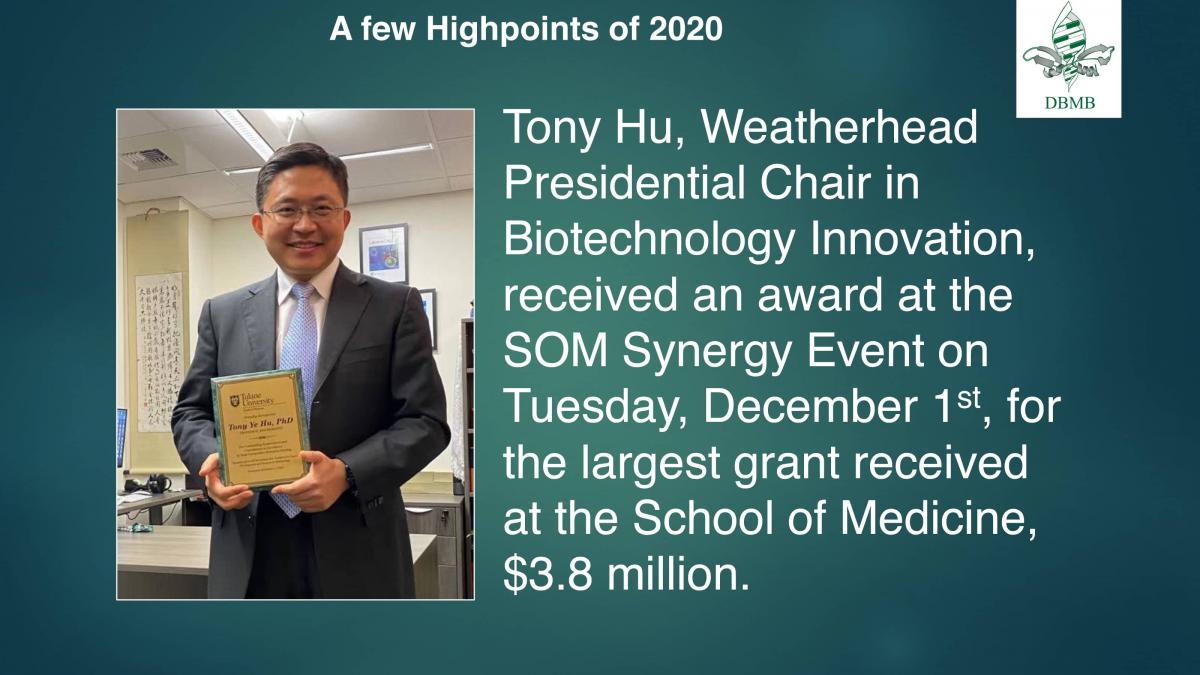
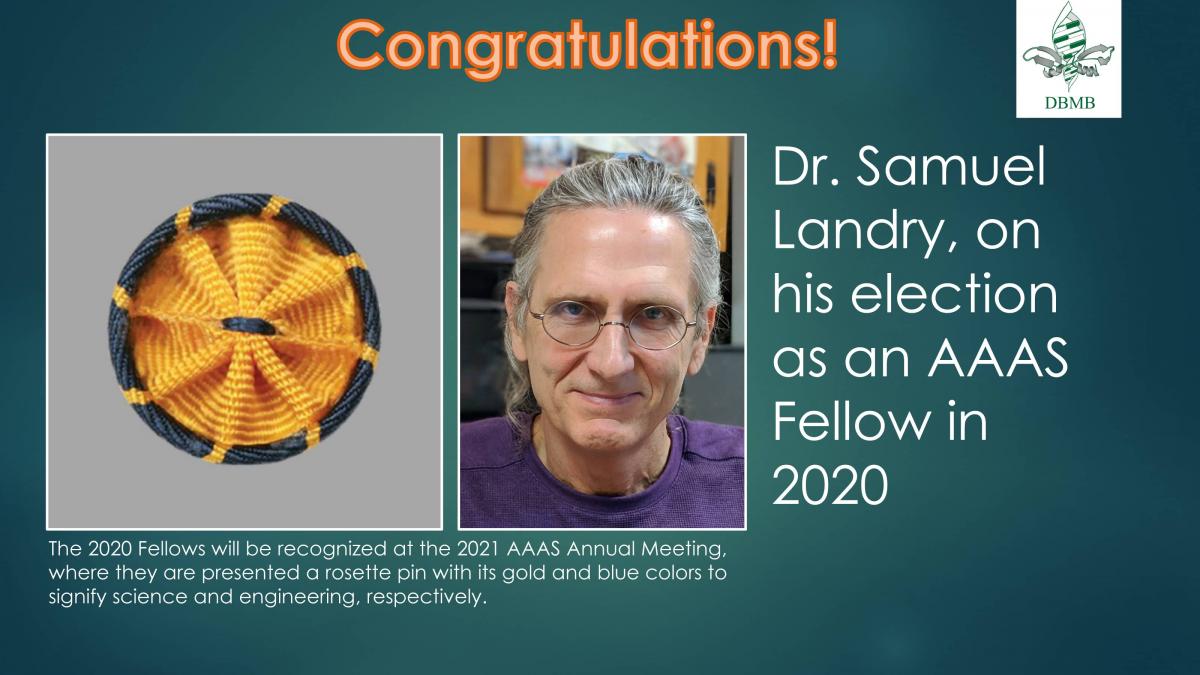
CONGRATULATIONS
Congratulations to Dr. Tony Hu, North American Chinese Clinical Chemists Association Innovation in Laboratory Medicine Awardee:
Title: Mobile based Nanoplasmonic Quantification of Mtb-derived Exosomes in Serum
Project lead: Tony Y. Hu PhD, Presidential Chair Professor of Biochemistry and Molecular Biology, Director of the Center for Cellular and Molecular Diagnostics, Tulane University School of Medicine.
(11/02/2020)
Click to Print List of Publications (pdf)
RESEARCH
Drs. Tony Hu and Bo Ning, along with their team are putting COVID-19 testing to the test in important research taking place in the lab.
To solve the current challenges of COVID-19 testing: how to quickly identify asymptomatic infected individuals, improve testing efficiency, and help communities and universities reopen, the Hu team have developed a fast, highly sensitive, high-throughput COVID-19 nucleic acid test based on CRISPR technology. Compared to conventional RT-qPCR, this method can detect the SARS-CoV-2 in less than one hour and can be done without relying on professional equipment and personnel. Dr. Hu’s team has submitted an EUA application to the FDA with the Molecular Pathology Department. A research article based on this approach has also been published in Biosensors and Bioelectronics (https://doi.org/10.1016/j.bios.2020.112316), which is the first research article of COVID-19 at Tulane University. Right now, the group is developing this technology to extend COVID-19 diagnosis in multiple body fluids. Tulane’s hematological team has utilized the Hu lab’s CRISPR technology as a reference test in patients who are highly specious COVID-19 but showed as RT-qPCR negative. A related case report has been published by Nature Bone Marrow Transplantation (https://doi.org/10.1038/s41409-020-0972-8).
Another new technology, a smartphone-based Point-of-Care (POC) test, can detect SARS-CoV-2 in saliva within 20 minutes and provide a comprehensive result through a cellphone. This device is user friendly for individuals without lab training and useful for home testing. The manuscript of this work is now under review.
(10/9/20)
PUBLISHED ARTICLE
In June, Karl P. Hodel, Meijuan J.S. Sun, Nathan Ungerleider, Vivian S. Park, Leonard G. Williams, David L. Bauer, Victoria E. Immethun, Jieqiong Wang, Zucai Suo, Department Chair Hua Lu, James B. McLachlan, and Zachary F. Pursell had an article published in Molecular Cell (Mol. Cell. 2020 Jun 18;78(6):1166-1177.e6. doi: 10.1016/j.molcel.2020.05.012.), titled “POLE Mutation Spectra Are Shaped by the Mutant Allele Identity, Its Abundance, and Mismatch Repair Status.” (Interdisciplinary article.)
Human tumors with exonuclease domain mutations in the gene encoding DNA polymerase ε (POLE) have incredibly high mutation burdens, frequently more than 100 and even in some cases approaching 500 or more mutations per Megabase. These errors arise in four unique mutation signatures occurring in different relative amounts, the etiologies of which remain poorly understood. This team used CRISPR-Cas9 to engineer human cell lines expressing POLE tumor variants, with and without mismatch repair (MMR). Whole-exome sequencing of these cells after defined numbers of population doublings permitted analysis of nascent mutation accumulation. Unlike an exonuclease active site mutant that was previously characterized, POLE cancer mutants readily drive signature mutagenesis in the presence of functional MMR. Comparison of cell line and human patient data suggests that the relative abundance of mutation signatures partitions POLE tumors into distinct subgroups dependent on the nature of the POLE allele, its expression level, and MMR status. These results suggest that different POLE mutants have previously unappreciated differences in replication fidelity and mutagenesis.
(10/9/20)
FRUIT FLIES HELP SHED LIGHT ON TUMOR FORMATION, MIGRATION AND GROWTH
(Reprinted with permission from Inroads, June 2020)
A Drosophila tumor induced by Dr. Wu-Min Deng's research team helps to answer questions about how cancerous cells form, grow and metastasize. (Photo provided by Dr. Wu-Min Deng.)
What can the common fruit fly teach us about cancer?
"Over the last few decades, the fruit fly - Drosophila melanogaster - has become a successful model for studying human cancers," said Wu-Min Deng, PhD, professor of biochemistry and molecular biology and the Gerald and Flora Jo Mansfield Piltz Professor of Cancer Research.
In fact, Deng says many cancer-related genes in humans are named after genes in flies, where they were first identified, and the model is helping to shed light on how tumors form, how they migrate, and how they behave.
"It's not a well-known model for cancer studies, because they don’t look like humans," said Deng. "There are even oncologists who don't realize we are using a fly model for basic cancer research, but the genetic simplicity and vast arsenal of genetic tools available in Drosophila provide a unique opportunity to address questions regarding cancer initiation and progression that would be extremely challenging in other model systems."
The simplicity of the Drosophila model is just one of its advantages, according to Deng. While its genetic makeup is much simpler than other organisms, many of the genes and pathways involved in human disease, particularly cancer, play similar roles in the fly, making it an excellent option for biologic discovery. Their systems are easier to manipulate, allowing researchers to generate mutations and target overexpression more easily. And because their life cycle is very short and they reproduce quickly, Deng's team can induce tumors to grow within a couple of days and manipulate fly larvae to carry the same tumor as the parent.
The Deng Lab's recent work involving isolating Drosophila ovaries for genetic sequencing of the various cells involved in oogenesis was recently featured on the home page of the online journal PLOS Biology.
"We use a few different fruit fly tissues to model growth regulation and tumor formation," said Deng. "Ovary is one. Ovaries produce functional eggs for the next generation. The process is very elaborate and involves interaction between several different cell types within the organ. But the process is also regulated by other systems, so this collaboration can be analyzed. We study what kind of cells types are there, the different genes expressed, and what kinds of signaling might be involved. We feel this project will be a good resource to the field. Anyone who wants to use this model to do any type of developmental or cancer studies can refer to our paper."
Deng moved his lab to Tulane from Florida State University a little less than a year ago. Since his arrival, he has begun to explore opportunities to interact and hopefully collaborate with fellow Tulane researchers using other model systems. His team is currently working on a new manuscript looking at how cell growth is regulated normally and how disruption can lead to tumor formation in the Drosophila model. "I am very fortunate to have a group of people in my lab who have worked tirelessly to make this project possible," said Deng.
(10/9/20)
PUBLISHED ARTICLE
In May, Ashkan Shahbandi, Sonia G. Rao, Ashlyn Y. Anderson, Wesley D. Frey, Joy O. Olayiwola, Nathan A. Ungerleider and James G. Jackson, PhD, had an article published in Cell Death & Differentiation (Cell Death Differ. 2020 May 26. doi: 10.1038/s41418-020-0564-6), titled “BH3 mimetics selectively eliminate chemotherapy-induced senescent cells and improve response in TP53 wild-type breast cancer.”
TP53 wild-type breast tumors rarely undergo a complete pathological response after chemotherapy treatment, portending poor prognosis to patients. Studies show these tumors preferentially undergo senescence instead of apoptosis. These senescent cells persist after chemotherapy and secrete cytokines and chemokines comprising the senescence associated secretory phenotype, which promotes survival, proliferation, and metastasis. The Jackson team hypothesized that eliminating senescent tumor cells would improve chemotherapy response and extend survival. Previous studies have shown “senolytic” agents selectively kill senescent normal cells, but their efficacy in killing chemotherapy-induced senescent cancer cells is unknown. Jackson’s group showed that ABT-263, a BH3 mimetic that targets antiapoptotic proteins BCL2/BCL-XL/BCL-W, had no effect on proliferating cells, but rapidly and selectively induced apoptosis in a subset of chemotherapy-treated cancer cells, though sensitivity required days to develop. Low NOXA expression conferred resistance to ABT-263 in some cells, necessitating additional MCL1 inhibition. Gene editing confirmed breast cancer cells relied on BCL-XL or BCL-XL/MCL1 for survival in senescence. In a mouse model of breast cancer, ABT-263 treatment following chemotherapy led to apoptosis, greater tumor regression, and longer survival. Their results reveal cancer cells that have survived chemotherapy by entering senescence can be eliminated using BH3 mimetic drugs that target BCL-XL or BCL-XL/MCL1. These drugs could help minimize residual disease and extend survival in breast cancer patients that otherwise have a poor prognosis and are most in need of improved therapies.
(10/9/20)
RESEARCH AWARD
Arthur J. Lustig, PhD, and Jeffrey Cary, PhD (USDA New Orleans), received a cooperative award from the USDA, titled “Probing Chromosome Structure to Activate Silent Metabolite Gene Clusters,” beginning September 1st, 2020.
Aspergillus flavus, a fungus that produces oncogenic aflatoxins, contains many uncharacterized biosynthetic gene clusters. The secondary metabolites produced by these gene clusters are currently unknown. The ARS PI will work with the cooperator to investigate the role that chromatin structure plays on the expression of secondary metabolites in the A. flavus with the goal of identifying new fungal metabolites that affect fungal fitness, pathogenicity, virulence, and toxicity.
These scientists will work with the cooperator to investigate silent or repressed secondary metabolite gene clusters in Aspergillus flavus using unique approaches that focus on altering the structure of chromosomes that could positively affect gene expression. Specifically, this team plans to activate gene clusters by inhibiting histone modifying enzymes, determine the influence of telomere position effect (TPE) on secondary metabolite production, and assess the effect of proteins that influence telomere chromatin structure and telomere length homeostasis on secondary metabolite biosynthesis.
(10/9/20)
PUBLICATION/RESEARCH
Fighting drug-resistant bacteria in the time of coronavirus
In April, the Wimley team’s paper, “Synthetic molecular evolution of host cell-compatible, antimicrobial peptides effective against drug-resistant, biofilm-forming bacteria,” was published in Proc Natl Acad Sci USA (2020 Apr 14;117[15]:8437-8448. doi: 10.1073/pnas.1918427117. Epub 2020 Apr 2. PMID: 32241895).
The Wimley lab has been busy during the SARS2 novel coronavirus pandemic developing potential treatments for drug-resistant bacterial infections. When SARS2 inevitably fades away, these pathogens, which are a severe and growing threat to public health, will grab the world’s attention once again. In fact, as many as half of all SARS2 deaths are associated with secondary bacterial infections. In April, the Wimley lab published a long study in the Proceedings of the National Academy of Sciences describing the synthetic molecular evolution of a new family of superior antimicrobial peptides (AMPs). But the optimization of peptide antibiotics did not end there! Graduate student Jenisha Ghimire has been hard at work designing and testing rational variants of the published peptides to identify those with even better properties. Jenisha’s work has been a great success. She has created optimized peptides that have very low cytotoxicity and unprecedented, broad-spectrum antibacterial activity against a large collection of clinically isolated, multi-drug resistant human bacterial pathogens. Some of the pathogens easily killed by the optimized peptides are completely resistant to all known antibiotics and are also resistant to some known AMPs. Fortunately, the needed data had been collected before the pandemic forced us to work from home, so Jenisha spent the weeks of shutdown productively writing a new paper describing her exciting results. Dr. Wimley expects this pandemic shutdown paper to be published by the end of the year.
(10/9/20)
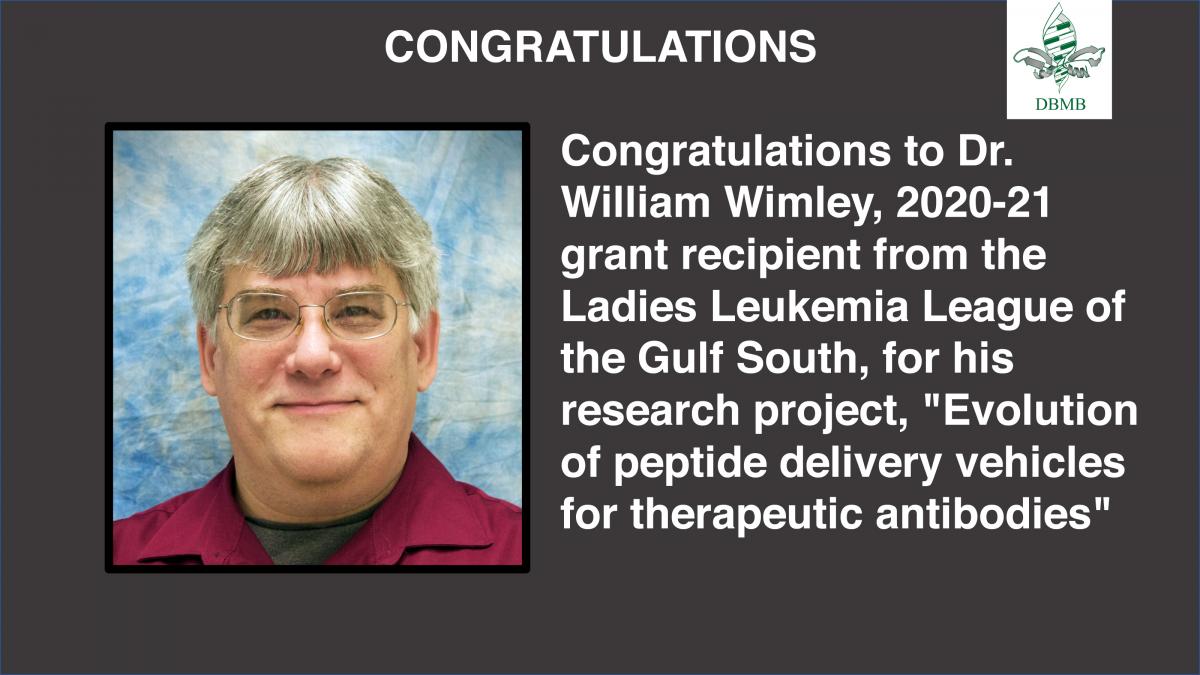
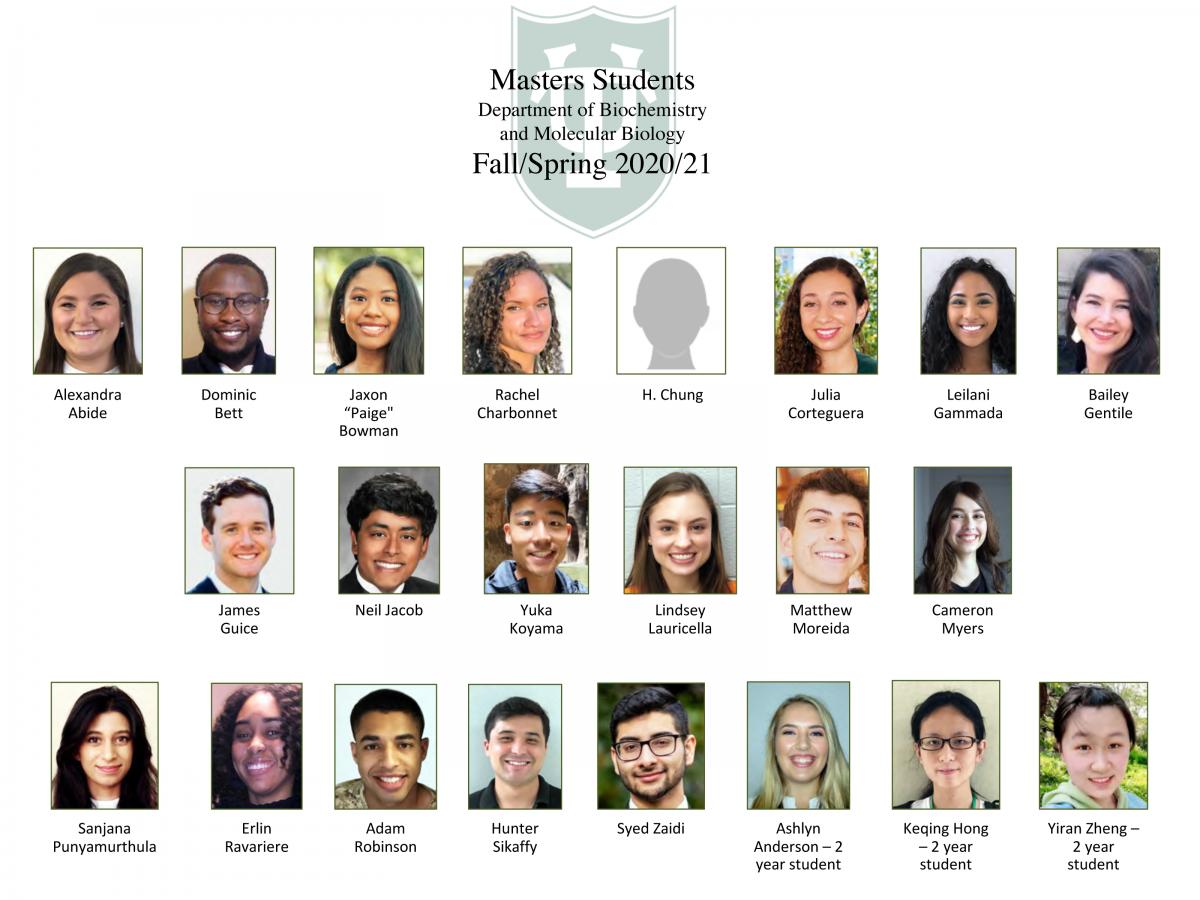
CONGRATULATIONS Ivana Celic, PhD, received a pilot award from Global Consortium for Reproductive Longevity and Equality (GCRLE) through the Buck Institute, entitled “LINE1 Retrotransposons in Female Reproductive Aging”, $200,000, August 1, 2020 through August 1, 2022.
CONGRATULATIONS to Jingping Liu, Meihua Wan, Tony Hu, and Christopher J. Lyon (2020) Nanomedicine therapies modulating macrophage dysfunction: a potential strategy to attenuate cytokine storms in severe infections. Theranostics (full citation forthcoming).
Challenges of COVID-19 testing – Taking it Step by Step
Bo Ning, PhD, Research Assistant Professor, Contributing Writer
How to quickly identify COVID-19 asymptomatic infected individuals, improve testing efficiency, and help communities and universities reopen has been the challenge of the Tony Hu lab.
The Hu lab rapidly developed a fast, highly sensitive, high-throughput COVID-19 nucleic acid test based on CRISPR technology. Compared to conventional qRT-PCR, this method can detect the SARS-Cov2 in less than one hour and can be done without relying on professional equipment or personnel.
With the Molecular Pathology Department, they have submitted an EUA application to the FDA. A research article based on this approach has been published in Biosensors and Bioelectronics (https://doi.org/10.1016/j.bios.2020.112316), which is the first research article on COVID-19 published from Tulane University. More importantly, their approach has helped doctors treat and save lives, and a related case report has been accepted by Nature Bone Marrow Transplantation.
(06/22/20)
Publications – April 1st - May 31st, 2020
The below list represents publications by faculty for the period shown above. In the event that we omitted a publication, these may appear later with full citations. Note that we are now indicating articles in press and accepted, due to the timely nature of the subjects they encompass.
Diane Blake
Borjac, J., El Joumaa, M., Kawach, R., Youssef, L., and Blake, D.A. (2020) Heavy metals and organic compounds contamination in leachates collected from Deir Kanoun Ras El Ain dump and its adjacent canal in South Lebanon. Heliyon 5 (2019) e02212.
Wu-Min Deng
Jevitt, A., Chatterjee, D., Xie, G., Wang, X.F., Otwell, T., Huang, Y.C., and Deng, W.M. (2020) A single-cell atlas of adult Drosophila ovary identifies transcriptional programs and somatic cell lineage regulating oogenesis. PLoS Biol. 2020 Apr 27;18(4):e3000538. doi: 10.1371/journal.pbio.3000538. eCollection 2020 Apr. PMID: 32339165.
Jia Fan and Tony Hu
Liu, Y., Fan, J., Xu, T., Ahmadinejad, N., Hess, K., Lin, S.H., Zhang, J., Liu, X., Liu, L., Ning, B. and Liao, Z., and Hu, T.Y. (2020) Extracellular vesicle tetraspanin-8 level predicts distant metastasis in non–small cell lung cancer after concurrent chemoradiation. Science Advances, 6(11), p.eaaz6162.
Sehrawat, T.S., Arab, J.P., Liu, M., Amrollahi, P., Wan, M., Fan, J., Nakao, Y., Dasgupta, D., Liao, C., Navarro-Corcuera, A., Pose, E., He, L., Mauer, A., Ventura-Cots, M., Bataller, R.A., Sanyal, A., J., Chalasani, N.P., Heimbach, J.K., Watt, K.D., Gores, G.J., Gines, P., Kamath, P.S., Simonetto, D.A., Hu, T., Shah, V H., and Malhi, H. (2020) Circulating extracellular vesicles carrying sphingolipid cargo for the diagnosis and dynamic risk profiling of alcoholic hepatitis. Hepatology. 2020, in press.
Liu, Y., Gu, Y., Lyon, C. J., Fan, J., Koay, E., Katz, M., Han, H., Von Hoff, D., and Hu, Y. (2020) Hypoxia-induced hydroxylated peptide in blood as predictive biomarker for prognosis of pancreatic cancer therapy. Science Bulletin. 2020, accepted.
Tony Hu
Huang, Z., Tian, D., Liu, Y., Lin, Z., Lyon, C., J., Lai, W., Fusco, D., Drouin, A., Yin, X., Hu, T., and Ning, B. (2020) Ultra-Sensitive High Throughput CRISPR Diagnosis of COVID-19. Biosensor and Bioelectronics 2020. accepted.
Hu, X., Liao, S., Bai, H., Gupta, S., Zhou, Y., Zhou, J., Jiao, L., Wu, L., Wang, M., Chen, X., Zhou, Y., Lu, X., Hu, T.Y., Zhang, Z., and Ying, B. (2020) LncRNA and predictive model to improve the diagnosis of clinically diagnosed pulmonary tuberculosis. J Clin Microbiol, 2020 Apr 15. pii: JCM.01973-19. doi: 10.1128/JCM.01973-19. [Epub ahead of print] PMID: 32295893.
Sun, D., Lyon, C., and Hu, T. (2020) Simulation-directed amplifiable nanoparticle enhanced quantitative scattering assay under low magnification darkfield microscope. Journal of Material Chemistry B 2020, accepted.
Huang, Z., Tian, D., Liu, Y., Lin, Z., Lyon, C.J., Lai, W., Fusco, D., Drouin, A., Yin, X., Hu, T., and Ning, B. (2020) Ultra-Sensitive High Throughput CRISPR Diagnosis of COVID-19. Biosensor and Bioelectronics 2020, accepted.
Hu, T., Frieman, M., and Walfram, J. (2020) Chloroquine against COVID-19: insights from the field of nanomedicine. Nature Nanotechnology. 2020, 15:247–249.
Shu, Q., Li, M., Shu, L., An, Z., Wang, J., Lv, H., Yang, M., Cai, T., Hu, T., Fu, Y., and Yang, F. (2020) Large-scale Identification of N-linked Intact Glycopeptides in Human Serum using HILIC Enrichment and Spectral Library Search. Mol Cell Proteomics. 2020, 19(4):672-689.
Hu, Q., Su, H., Li, J., Lyon, C., Tang, W., Wan, M., and Hu, T. (2020) Clinical Applications of Exosome Membrane Proteins. Precision Clinical Medicine. 2020, 3(1):54–66.
Wan, M., Wang, Y., Zhan, L., Fan, J. and Hu, T.Y. (2020) MALDI-TOF mass spectrometry-based quantification of C-peptide in diabetes patients. European Journal of Mass Spectrometry, 26(1):55-62.
James Jackson
Shahbandi, A., Rao, S.G., Anderson, A.Y., Frey, W.D., Olayiwola, J., Ungerleider, N.A., and Jackson, J.G. (2020) BH3 mimetics selectively eliminate chemotherapy-induced senescent cells and improve response in TP53 wild-type breast cancer. Cell Death & Differentiation https://doi.org/10.1038/s41418-020-0564-6.
Samuel Landry
Cassotta, A., Paparoditis, P., Geiger, R., Mettu, R.R., Landry, S.J., Donati, A., Benevento, Foglierini, M., Lewis, D.J.M., Lanzavecchia, A., and Sallusto. F. (2020) Deciphering and predicting CD4+ T cell immunodominance of Influenza virus hemagglutinin. Journal of Experimental Medicine, in press.
Hong Liu
Zhang, Q. and Hong L. (2020) Functioning mechanisms of Shugoshin-1 incentromeric cohesion during mitosis. Essays in Biochemistry (2020) EBC20190077 https://doi.org/10.1042/EBC20190077.
Zhang, Q., Hu, L., Chen, Y., Tian, W., and Liu, H. (2020) Multisite Phosphorylation Determines the Formation of Ska-Ndc80 Macro-complexes That Are Essential for Chromosome Segregation during Mitosis. Mol Biol Cell, in press.
Hua Lu
Fuselier, T.T. and Lu, H. (2020) PHLD class proteins: p53-dependent and independent roles in cancer and metabolism. International Journal of Molecular Sciences. Invited review. In press.
Nguyen, D., Yang, K., Chiao, L., Deng, Y., Zhou, X., Zhang, Z., Zeng, S.X., and Lu, H. (2020) Inhibition of tumor suppressor p73 by nerve growth factor receptor via chaperone-mediated autophagy. JMCB. In press. PMID:32285119.
Hao, Q., Wang, J.Q., Chen, Y.J., Wang, S.S., Cao, M.M., Lu, H., and Zhu, X. (2020) Dual regulation of p53 by the ribosome maturation factor SBDS. Cell Death and Disease. 11(3):197. Doi 10.1038/s41419-020-2393-4.
Wang, H., Liao, P., Zeng, S.X., and Lu, H. (2020). Co-targeting CDK5 and p53-R249S as a potential therapy for HCC. Cancer Biology & Therapy. 21:269-277.
Jung JH, Cao B, Liao P, Zeng SX, and Lu H (2020) RNA-binding protein 10 induces apoptosis and suppresses proliferation by activating p53. Oncogene. 10, 10-34-9. 2019.
Brown P, RELISH Consortium (..Lu H et al..), Zhou YQ (2019) Large expert-curated database for benchmarking document similarity detection in biomedical literature search. Database. 1-67. Doi: 10.1093/database/baz085.
Heather Machado
Ibrahim, A.M., Gray, Z., Gomes, A.M., Myers, L., Behbod, F., and Machado, H.L. (2020) Gas6 expression is reduced in advanced breast cancers. NPJ Precis Oncol. 2020 Apr 24;4:9. doi: 10.1038/s41698-020-0116-z. eCollection 2020. PMID: 32352034.
Zachary Pursell and Hua Lu
Hodel, K.P., Sun, M.J.S., Ungerleider, N., Park, V.S., Williams, L.G., Bauer, D.L., Immethun, V.E., Wang, J.Q., Suo, Z., Lu, H., McLachlan, J.B., and Pursell, Z.F. (2020) POLE Mutation Spectra Are Shaped by the Mutant Allele Identity, Its Abundance, and Mismatch Repair Status. Molecular Cell. 78:1-12, June 18, 2020.
William Wimley and Hua Lu
Liao, P., Bhattarai, N., Cao, B., Zhou, X., Jung, J.H., Damera, K., Fuselier, T.T., Thareja, S., Wimley, W.C., Wang, B., Zeng, S.X., and Lu, H. Crotonylation at serine 46 impairs p53 activity. Biochem Biophys Res Commun. 2020 Apr 9;524(3):730-35. doi: 10.1016/j.bbrc.2020.01.152. Epub 2020 Feb 5. PMID: 32035620.
William Wimley
Starr, C.G., Ghimire, J., Guha, S., Hoffmann, J.P., Wang, Y., Sun, L., Landreneau, B.N., Kolansky, Z.D., Kilanowski-Doroh, I.M., Sammarco, M.C., Morici, L.A., and Wimley, W.C. (2020) Synthetic molecular evolution of host cell-compatible, antimicrobial peptides effective against drug-resistant, biofilm-forming bacteria. Proc Natl Acad Sci U S A. 2020 Apr 14;117(15):8437-8448. doi: 10.1073/pnas.1918427117. Epub 2020 Apr 2. PMID: 32241895.
Wang, Y., Hoffmann, J.P., Chou, C.W., Höner Zu Bentrup, K., Fuselier, J.A., Bitoun, J.P., Wimley, W.C., and Morici, L.A. (2020) Burkholderia thailandensis outer membrane vesicles exert antimicrobial activity against drug-resistant and competitor microbial species. J Microbiol. 2020 Apr 11. doi: 10.1007/s12275-020-0028-1. [Epub ahead of print] PMID: 32281050.
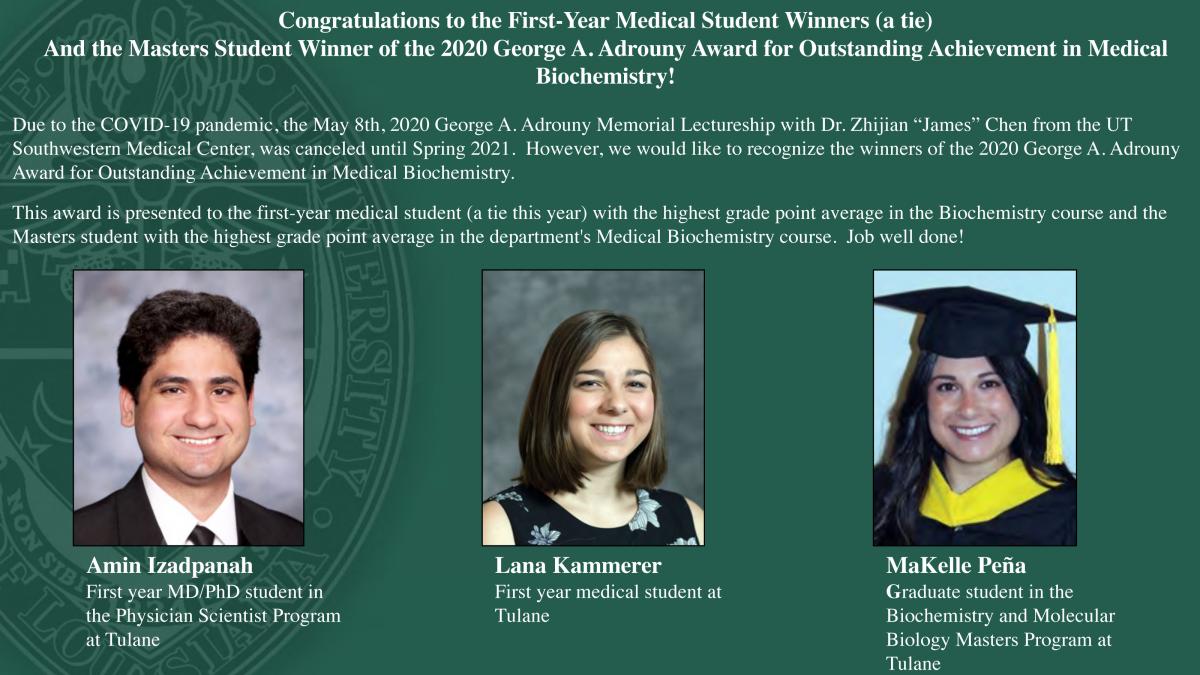
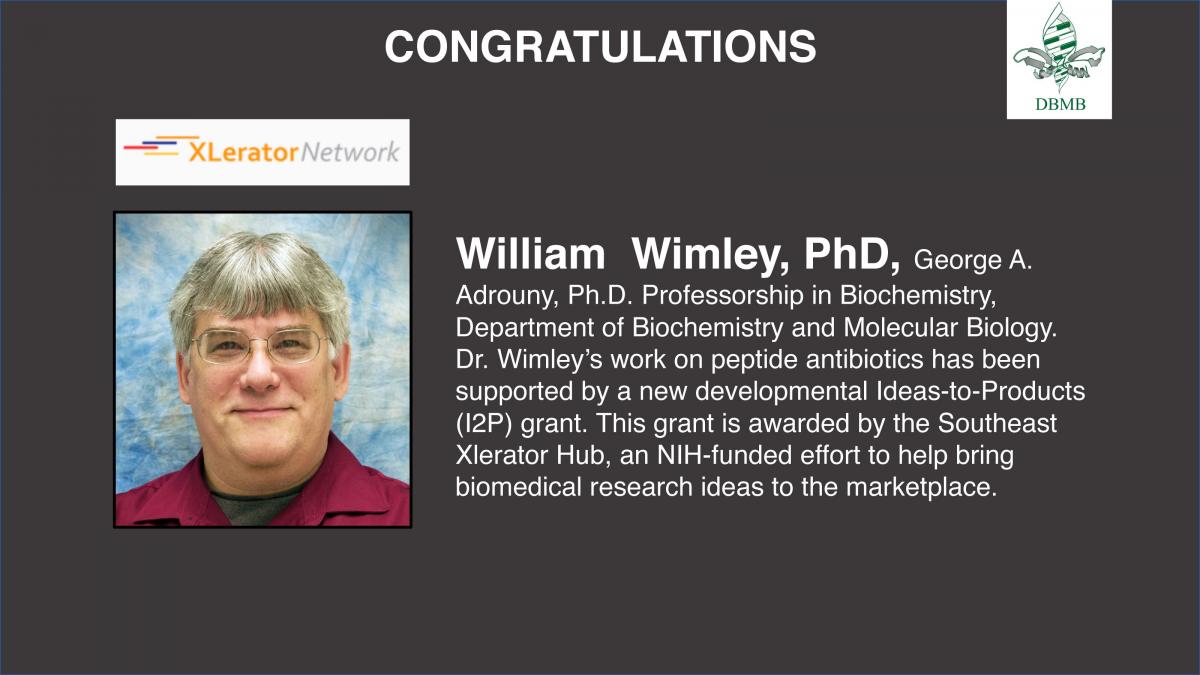
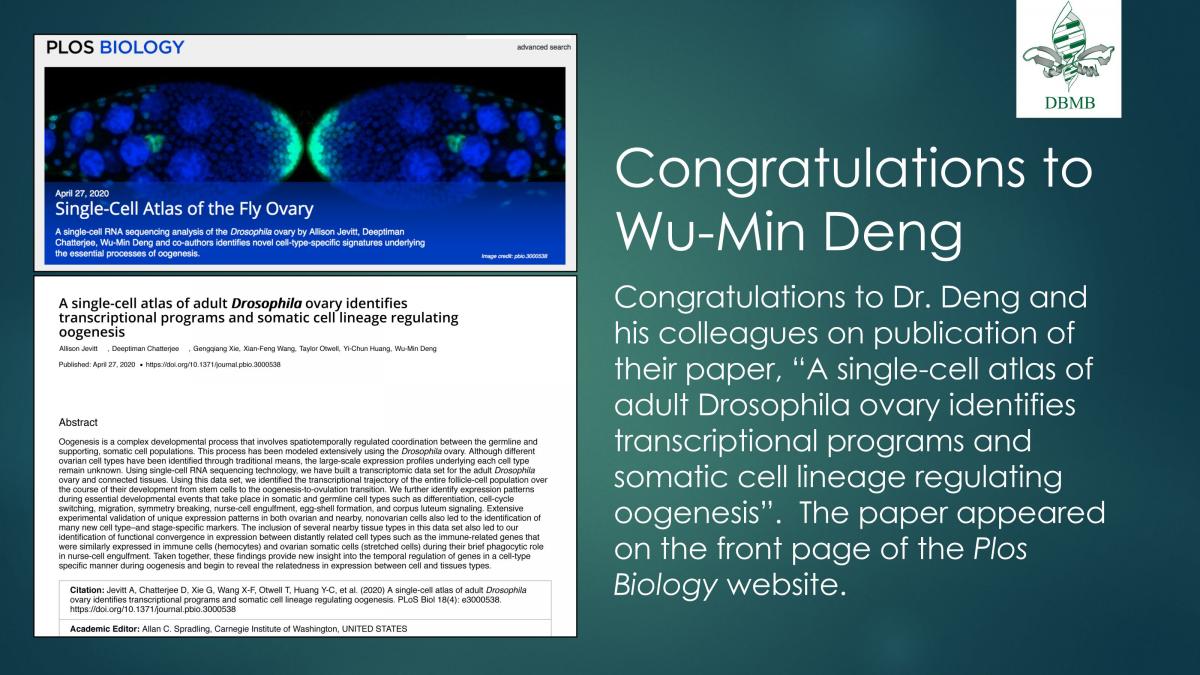
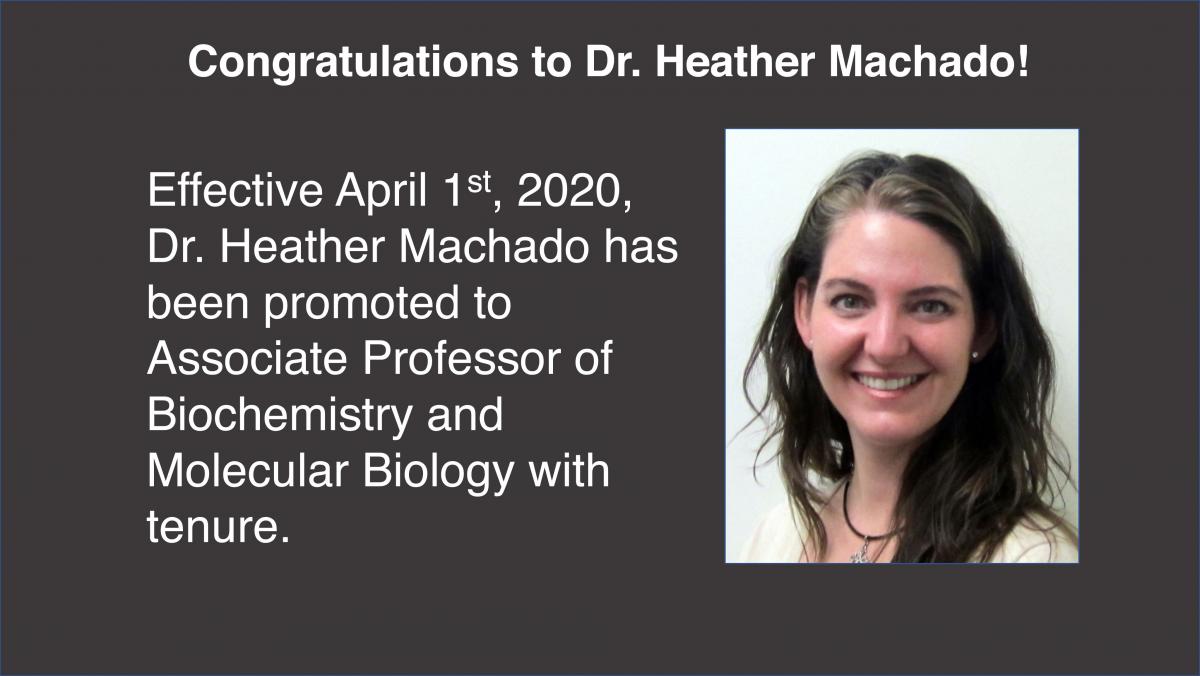
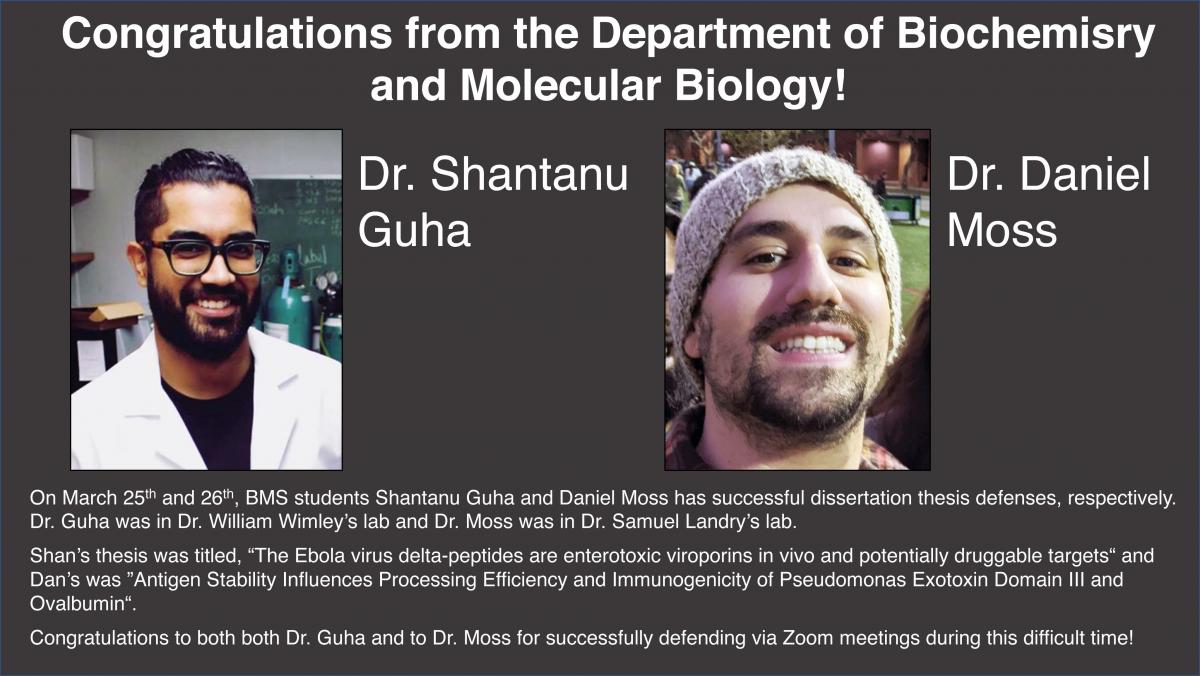
Faculty Profiles
William Wimley - Tulane researchers discover possible pathways to treating drug-resistant infections ==> click here
Tony Hu - Tulane researchers developing rapid test for tuberculosis with DOD grant ==> click here
Tony Hu - Researchers identify marker that may predict whether lung cancer likely to spread ==> click here
Newsworthy
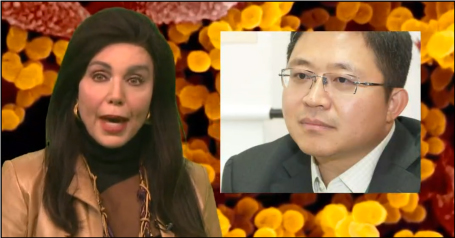
Our department’s Dr. Tony Hu appeared on WWL TV on Wednesday, February 26th, in the segment, “Doctors say this is not the time to panic over coronavirus: For fact not fear, we turned to two experts at Tulane.”
Canceled due to the COVID-19 Pandemic - May 8, 2020, ZhiJian "James" Chen, PhD
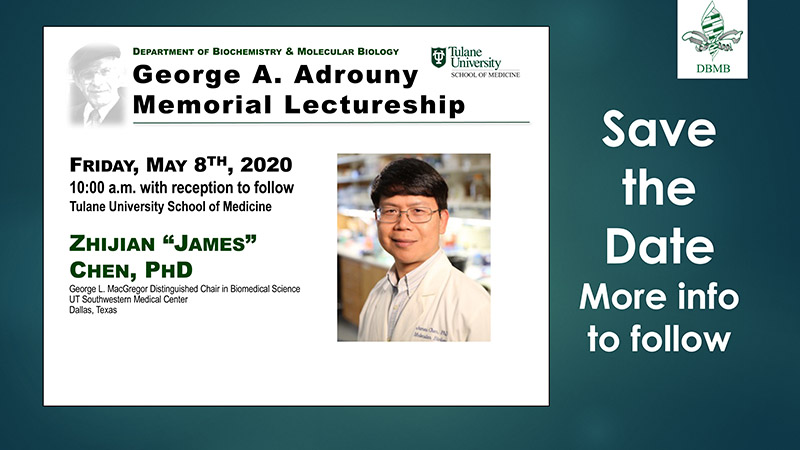
Congratulations to Dr. Jeffrey Han, School of Medicine Bridge Funding Program, January 2020
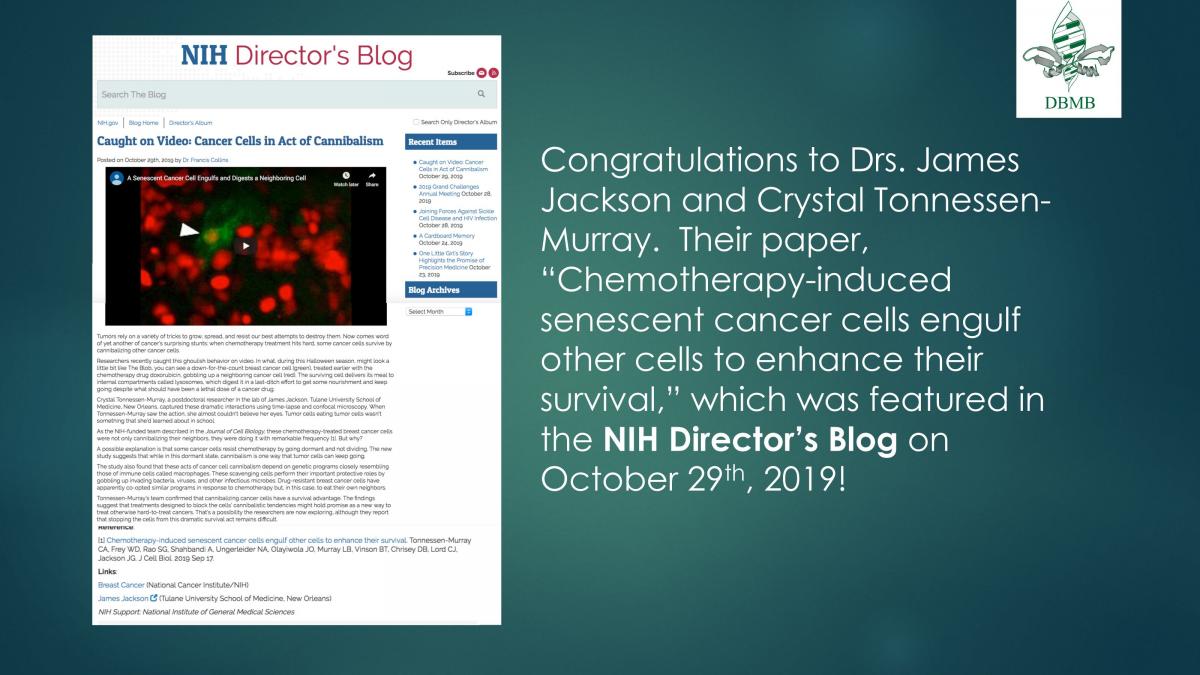
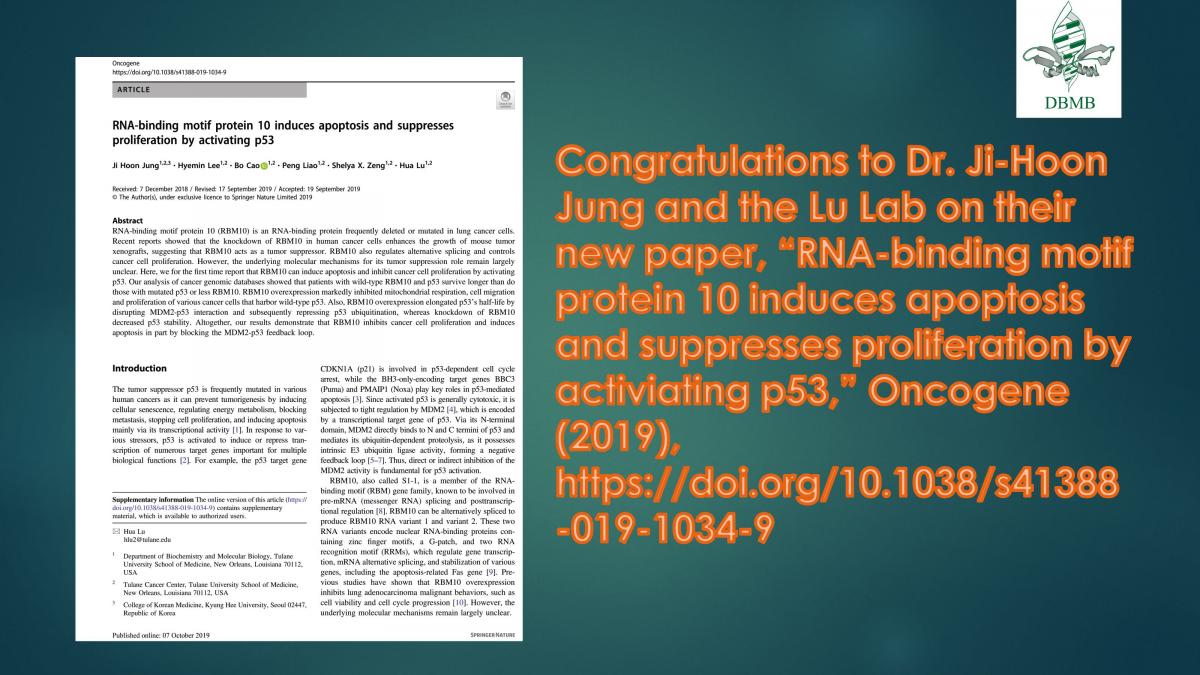
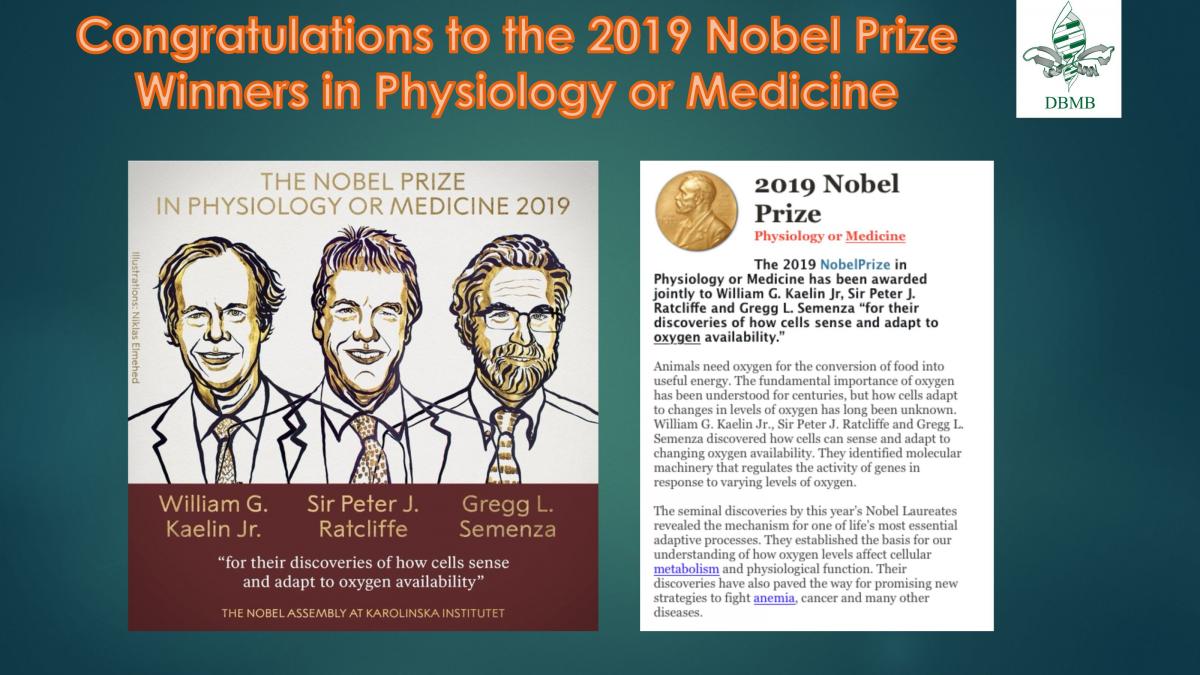
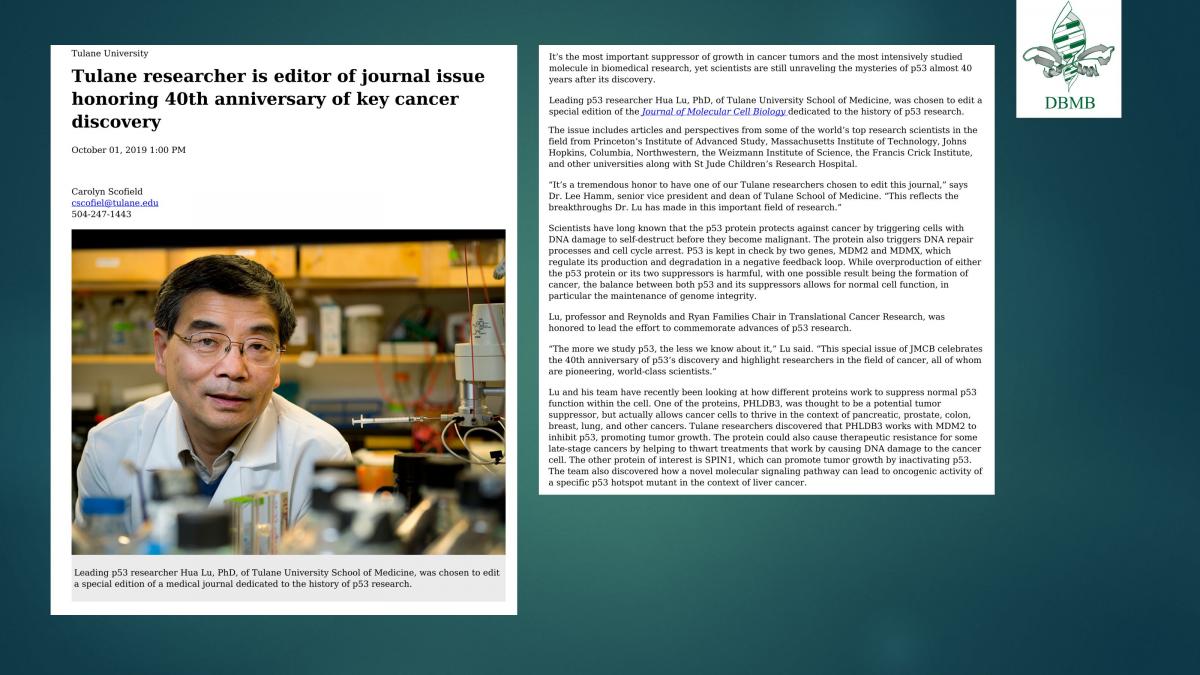
Read this story here.
Paper gets picked up by the Scientific American
Congratulations to Drs. James Jackson and Crystal Tonnessen-Murray. Their paper, “Chemotherapy-induced senescent cancer cells engulf other cells to enhance their survival,” which was published in the September 2019 issue of the Journal of Cell Biology, was picked up by the Scientific American.
Reprinted from Tulane News
Cancer cells turn to cannibalism to survive chemotherapy
September 18, 2019 7:45 AM
Keith Brannon kbrannon@tulane.edu
This video shows a doxorubicin-treated senescent breast cancer cell (green) engulfing a neighboring cancer cell (red). Video by Tonnessen-Murray et al., 2019
Researchers from Tulane University School of Medicine have discovered that some cancer cells survive chemotherapy by eating their neighboring tumor cells. The study, which was published in the Journal of Cell Biology, suggests that this act of cannibalism provides these cancer cells with the energy they need to stay alive and initiate tumor relapse after the course of treatment is completed. Read More
Chemotherapy drugs such as doxorubicin kill cancer cells by damaging their DNA, but cells that survive initial treatment can soon give rise to relapsed tumors. This is a particular problem in breast cancers that retain a normal copy of a gene called TP53. Instead of dying in response to chemotherapy-induced DNA damage, these cancer cells generally just stop proliferating and enter a dormant but metabolically active state known as senescence. In addition to surviving chemotherapy, these senescent cancer cells produce large amounts of inflammatory molecules and other factors that can promote the tumor's regrowth. Chemotherapy-treated breast cancer patients with normal TP53 genes are therefore prone to relapse and have poor survival rates.
"Understanding the properties of these senescent cancer cells that allow their survival after chemotherapy treatment is extremely important," said Crystal A. Tonnessen-Murray, a postdoctoral research fellow in James G. Jackson's laboratory at the School of Medicine.
In the new study, Tonnessen-Murray and colleagues discovered that, after exposure to doxorubicin or other chemotherapy drugs, breast cancer cells that become senescent frequently engulf neighboring cancer cells. The researchers observed this surprising behavior not only in cancer cells grown in the lab, but also in tumors growing in mice. Lung and bone cancer cells are also capable of engulfing their neighbors after becoming senescent, the researchers discovered.
Tonnessen-Murray and colleagues found that senescent cancer cells activate a group of genes that are normally active in white blood cells that engulf invading microbes or cellular debris. After “eating" their neighbors, senescent cancer cells digested them by delivering them to lysosomes, acidic cellular structures that are also highly active in senescent cells.
Importantly, the researchers determined that this process helps senescent cancer cells stay alive. Senescent cancer cells that engulfed a neighboring cell survived in culture for longer than senescent cancer cells that didn't. The researchers suspect that consuming their neighbors may provide senescent cancer cells with the energy and materials they need to survive and produce the factors that drive tumor relapse.
"Inhibiting this process may provide new therapeutic opportunities, because we know that it is the breast cancer patients with tumors that undergo TP53-mediated senescence in response to chemotherapy that have poor response and poor survival rates," Jackson said.
Publications, June 1st – August 31st, 2019
Diane Blake
Ojo, O.F., Farinmade, A., Trout, J., Omarova, M., He, J., John, V., Blake, D.A., Lvov, Y.M., Zhang, D., Nugyen, D., and Bose, A. Stoppers and skins on clay nanotubes help stabilize oil-in-water emulsions and modulate the release of encapsulated surfactants. ACS Appl. Nano Mater. 2:3490-3500.
Sahiner, M., Blake, D.A., Fullerton, M.L., Suner, S.S., Sunnol, A.K., and Sahiner, N. (2019) Enhancement of biocompatibility and carbohydrate absorption control potential of rosmarinic acid through crosslinking into microparticles. Int. J. Biolog. Macromol. 137:836-843.
Yu., T., Swientoniewski, L.T., Omarova, M., Li, M.-C., Negulescu, I.I., Darvish, O.A., Panchal, A., Blake, D.A., Wu, Q.-L., Lvov, Y.M., John, V.T., and Zhang, D. (2019) Investigation of amphiphilic polypeptoid-functionalized halloysites nanotubes as stabilizer towards oil spill remediation. ACS Appl. Mat. Interfaces 2019 Aug 7;11(31):27944-27953.
Omarolva, M., Swientoniewski, L., Tsengam, M., Igor, K., Blake, D., John, V., McCormic, A., Bothun, G., Ragavan, S., and Bose, A. (2019) Biofilm Formation by Hydrocarbon-Degrading Marine Bacteria and its Effects on Oil Dispersion, ACS Sustain. Chem. Engin. July 29, 2019 https://doi.org/10.1021/acssuschemeng.9b01923.
Tony Hu
Rodrigues, M., Richards, N., Ning, B., Lyon, C.J., and Hu, T.Y. (2019) Rapid Lipid-Based Approach for Normalization of Quantum-Dot-Detected Biomarker Expression on Extracellular Vesicles in Complex Biological Samples. Nano Lett. 2019 Jul 25. doi: 10.1021/acs.nanolett.9b02232. [Epub ahead of print]
Zhang, F., Lyon, C.J., Fan, J., and Hu, T.Y. (2019) A cathepsin B-dependent cleavage product of serum amyloid A identifies patients with chemotherapy-related cardiotoxicity. ACS Pharmacology and Translational Science. 2019, Accepted.
Hua Lu
Lu, H. (2019) Legends of p53: untold four-decade stories. J Mol Cell Biol. 2019 Aug 13. pii: mjz079. doi: 10.1093/jmcb/mjz079. [Epub ahead of print]
Zachary Pursell
Pathak, P., Yao, W., Hook, K.D., Vik, R., Winnerdy, F.R., Brown, J.Q., Gibb, B.C., Pursell, Z.F., Phan, A.T., and Jayawickramarajah, J. (2019) Bright G-Quadruplex Nanostructures Functionalized with Porphyrin Lanterns. J Am Chem Soc. 2019 Aug 14;141(32):12582-12591. doi: 10.1021/jacs.9b03250. Epub 2019 Aug 1.
William Wimley
Wimley, W.C. (2019) Application of Synthetic Molecular Evolution to the Discovery of Antimicrobial Peptides. Adv Exp Med Biol. 2019;1117:241-255. doi: 10.1007/978-981-13-3588-4_13.
Congratulations to Dr. Tony Hu on his New Paper "Rapid Lipid-Based Approach for Normalization of Quantum-Dot-Detected Biomarker Expression on Extracellular Vesicles in Complex Biological Samples"
To learn more, visit https://www.ncbi.nlm.nih.gov/pubmed/?term=Rapid+Lipid-Based+Approach+for+Normalization+of+Quantum-Dot-Detected+Biomarker+Expression+on+Extracellular+Vesicles+in+Complex+Biological+Samples
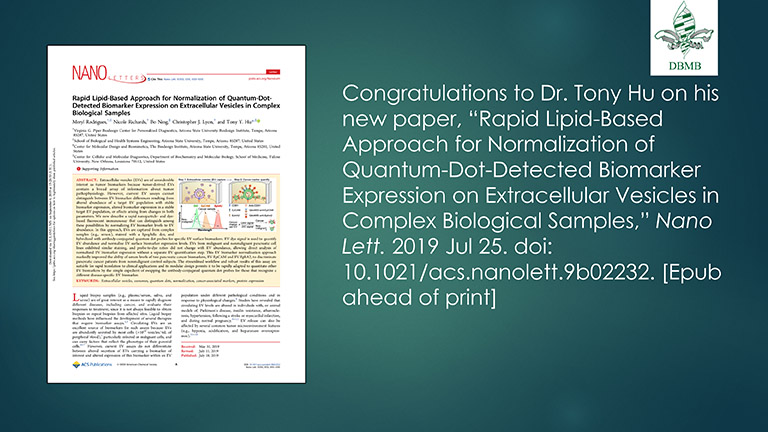
Congratulations to Dr. Hua Lu on his New Paper "Legends of p53: Untold Four-Decade Stories"
To learn more, visit https://academic.oup.com/jmcb/issue/11/7
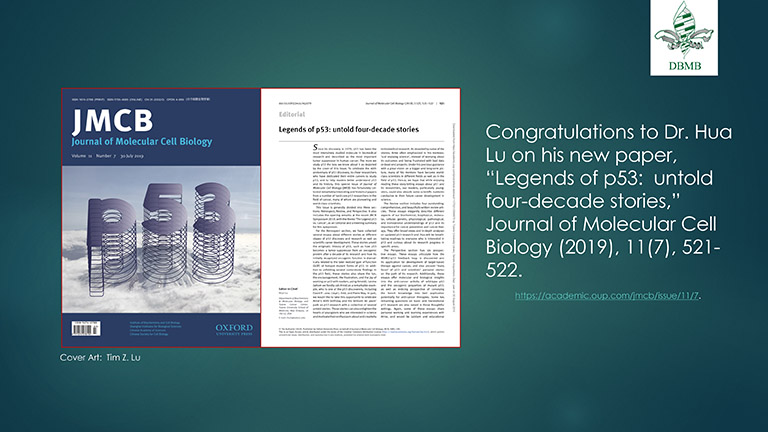
Welcome Wu-Min Deng
The Department of Biochemistry and Molecular Biology is pleased to announce that Dr. Wu-Min Deng will be joining our department starting August 1st as a Professor in Biochemistry and Molecular Biology and the Gerald & Flora Jo Mansfield Piltz Endowed Professorship in Cancer Research.
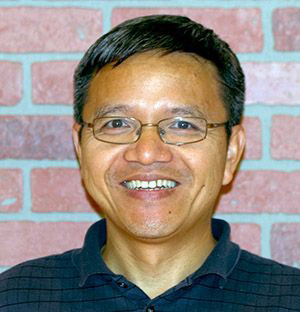
Dr. Deng received his Bachelor’s degree from Sichuan University in 1991, a Master’s degree from Shanghai Institute of Cell Biology in 1994, and a PhD degree from the University of Edinburgh in 1997. After completing his postdoctoral training at University of Washington, Wu-Min was appointed as an Assistant Professor at Florida State University in 2003. From there, he was promoted as an Associate Professor in 2009 and a full Professor in 2014.
Using the genetically tractable Drosophila model, Dr. Deng’s research focuses on fundamental questions in cancer biology and developmental biology. His research topics range from understanding how the tissue microenvironment contributes to neoplastic tumor transformation and progression to studying how growth and tissue homeostasis are regulated during development and tumorigenesis. The research in his laboratory has led to the development of novel concepts such as tissue “tumor hotspots” and “compensatory cellular hypertrophy,” and publications in high-impact journals. Dr. Deng has received continuous external funding, and was awarded the University Developing Scholar Award in 2010, and the Pfeiffer Endowed Professorship for Cancer Research in 2018.
Dr. Deng has extensive experience in mentoring and teaching. Dr. Deng was a recipient of the University Honors Mentoring Award in 2013. Among the graduate students and postdoctoral fellows trained in his lab, many have moved on to take faculty positions in various institutions. Dr. Deng has served as an ad hoc member on multiple NIH study sections, and on the editorial boards of Journal of Genetics and Genomics and Scientific Reports. In addition, he has served on numerous departmental and university committees, including the University Council on Research and Creativity, the University Senate, the Promotion and Tenure committee, the Chair Selection Committee, and the Rhodes Scholar committee.
Reposted from Tulane News
Tulane University names leading developer of advanced biomedical diagnostics newest Presidential Chair
July 16, 2019 7:00 AM
Keith Brannon
kbrannon@tulane.edu
504-862-8789
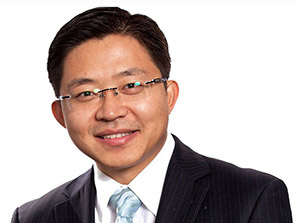 Tulane University has named research scientist Tony Hu, PhD, a pioneer in developing advanced diagnostics for personalized medicine, as its second endowed presidential chair.
Tulane University has named research scientist Tony Hu, PhD, a pioneer in developing advanced diagnostics for personalized medicine, as its second endowed presidential chair.
To fill presidential chairs, Tulane recruits exceptional, internationally recognized scholars whose work transcends traditional academic disciplines.
Hu joins Tulane University School of Medicine as the Weatherhead Presidential Chair in Biotechnology Innovation and will lead the school’s newly created Center of Cellular and Molecular Diagnosis. He exemplifies the interdisciplinary focus of the presidential professors with a primary appointment in the Department of Biochemistry and Molecular Biology and secondary appointments in the School of Science and Engineering, School of Public Health and Tropical Medicine and the Tulane National Primate Research Center.Read More
Hu previously served as professor at the Biodesign Institute at Arizona State University’s Virginia G. Piper Center for Personalized Diagnostics and at ASU’s School of Biological and Health Systems Engineering. His research focuses on developing and validating highly sensitive blood tests that rely on nanotechnology-based strategies to find previously undetectable biomarkers of diseases. These diagnostics can also be used to develop personalized medicine tailored to a patient’s specific genetic strain of disease.
“Dr. Hu is a visionary whose groundbreaking work developing new methods to find undiscovered markers of disease has the potential to improve countless lives and transform medicine,” said Tulane President Mike Fitts. “He exemplifies the extraordinary ideals we seek in a presidential chair, which is to work across disciplines to pursue discoveries that can make a global impact.”
Presidential chairs are one of Fitts’ top priorities as he seeks to attract some of the world’s most renowned faculty members in areas such as biomedicine, coastal restoration, global health, the humanities and fields yet to be explored. Hu’s chair is funded by the Weatherhead Foundation, an Ohio-based family organization that has generously supported higher education, including Tulane, for decades.
Hu’s research aims to fill current unmet clinical needs for early disease detection, better predictors of disease progression and real-time monitoring of therapy response to improve patient outcomes. He has assembled a diverse research team with backgrounds in biochemistry, mass spectrometry, nanofabrication and biomedical engineering to address these challenges.
Hu will establish the Center of Cellular and Molecular Diagnosis to leverage both new and existing platforms for the improved analysis of diagnostic factors found in liquid biopsy samples, including proteins, nucleic acids and extracellular vesicles, which are tiny particles of material released by living cells. The new center’s mission will be to promote interactions between diverse teams of researchers to accelerate the discovery and clinical development of more effective diagnostic biomarkers.
“One of our priorities at the School of Medicine is to expand opportunities for outstanding translational research that will have a direct impact on clinical care,” said Dr. Lee Hamm, senior vice president and dean of Tulane School of Medicine. “Dr. Hu and his research team are dedicated to giving doctors the advanced tools they need to diagnose diseases much sooner than currently possible, make treatments more effective and improve outcomes for their patients.”
Hu received his PhD in biomedical engineering from the University of Texas at Austin where he focused on developing nanomaterials as biosensors for disease diagnosis. He has published more than 70 journal articles and has received 10 U.S. and international patents in this area since his first faculty appointment in 2011. Three of his innovations have been licensed by US-based companies and are under development for commercialization. His research team has received grant support from the National Institutes of Health, the Department of Defense and the Gates, Johns Dunn and Kostas Cockrell family foundations.
(07/17/19)
The 2019 George A. Adrouny Lectureship
In spite of bad weather, a responsive group turned out to enjoy an important seminar by Dr. George Alt during the 2019 George A. Adrouny Lectureship and several awards were presented in the first floor auditorium of 1430 Tulane Avenue.
The May 10th event began at 9:30am with opening comments by the George A. Adrouny Professor of Biochemistry and Molecular Biology Dr. William Wimley, followed by the presentation of the George A. Adrouny Award for Outstanding Achievement in Medical Biochemistry, presented to Medical student Rafael Tiongco, and presented to Masters student Isabella McCormack by Dr. David Franklin.
This was followed by an introduction of Dr. Frederick Alt of the Dana-Farber/Harvard Cancer Center in Boston, Massachusetts. Dr. Alt’s seminar was titled “The fundamental role of active chromosome loop extrusion in antibody diversification and genome rearrangements”.
This was the 18th year for the seminar.Read More
Frederick Alt received his PhD in Biology from Stanford University in 1977, where he worked with Robert Schimke and discovered gene amplification and genomic instability in mammalian cancer cells. Alt moved to MIT for postdoctoral work with David Baltimore, where he helped elucidate basic principles of recombination in the immune system. His work with David Baltimore included the discovery that production of membrane versus secreted immunoglobulin is achieved via differential RNA processing and the discovery that allelic exclusion of Immunoglobulin (Ig) gene rearrangements is controlled by feedback from protein products. With Baltimore, Alt also elucidated major aspects of the V(D)J recombination mechanism, including involvement of site-specific DNA double strand breaks (DSBs) that are end joined, as well as the discovery of ”N” regions added by terminal deoxynucleotydl transferase (TdT) that provide a major source of antigen receptor diversity.
Frederick Alt has been elected to the National Academy of Sciences, the Institute of Medicine (National Academy of Medicine), the American Academy of Arts and Sciences, and the European Molecular Biology Organization. His cancer biology awards include the American Association of Cancer Research Clowes Award, the Pasarow Foundation Prize for Extraordinary Achievement in Cancer Research, the National Cancer Institute Alfred K. Knudson Award for "Pioneering Contributions that Revolutionized the Field of Cancer Genetics", the Leukemia and Lymphoma Society de Villiers Award, The Katharine Berkan Judd Award from Memorial Sloan Kettering Cancer Center, the Albert Szent-Gyorgyi Prize for Progress in Cancer Research from the National Foundation for Cancer Research, and the American-Italian Cancer Foundation Prize for Excellence in Medicine. His immunology awards include the American Association of Immunologists (AAI) Huang Meritorious Career Award, the Cancer Research Institute (CRI) Coley Award, and the Novartis Prize for Basic Immunology. More generally, he has also received the Arthur Kornberg & Paul Berg Lifetime Achievement Award in Biomedical Science and the Lewis S. Rosensteil Prize for Distinguished work in Biomedical Sciences. Dr. Alt serves on numerous editorial boards and is Editor in Chief of Advances in Immunology. He also serves on many national and international advisory boards and is currently Chair of the Scientific Advisory Committee of the Cold Spring Harbor Laboratory. Dr. Alt has mentored over 100 students and research fellows, many of whom have become leaders in immunology, genetics, or cancer biology and he received the American Association of Immunologists Excellence in Mentoring Award and the William A. Silen Award for Lifetime Achievement in Mentoring from Harvard Medical School. The Cancer Research Institute of New York annually presents the Frederick W. Alt Award for New Discoveries in Immunology.
For more information on the George Adrouny Memorial Lectureship and on past seminars, please visit our website at:
https://medicine.tulane.edu/departments/biochemistry-molecular-biology/george-adrouny-lecture
(5/28/19)
Publications, January 1st – March 31st, 2019
The below list represents publications by faculty for the first quarter of 2019.
David Franklin
Martel, J.L. and Franklin, D.S. (2019) Vitamin B1 (Thiamine). StatPearls [Internet]. Treasure Island (FL): StatPearls Publishing, 2019 Jan 26.
James Jackson
Shahbandi, A. and Jackson, J.G. (2019) Analysis across multiple tumor types provides no evidence that mutant p53 exerts dominant negative activity. NPJ Precis Oncol. 2019 Jan 7;3:1. doi: 10.1038/s41698-018-0074-x. eCollection 2019.
Samuel Landry
Moss, D.L., Park, H.W., Mettu, R.R., and Landry, S.J. (2019) Deimmunizing substitutions in pseudomonas exotoxin domain III perturb antigen processing without eliminating T-cell epitopes. J Biol Chem. 2019 Jan 25. pii: jbc.RA118.006704. doi: 10.1074/jbc.RA118.006704. [Epub ahead of print]
Hong Liu
Hu, L., Huang, H., Hei, M., Yang, Y., Li, S., Liu, Y., Dou, Z., Wu, M., Li, J., Wang, G.Z., Yao, X., Liu, H., He, X., and Tian, W. (2019) Structural analysis of fungal CENP-H/I/K homologs reveals a conserved assembly mechanism underlying proper chromosome alignment. Nucleic Acids Res. 2019 Jan 10;47(1):468-479. doi: 10.1093/nar/gky1108.
Hua Lu
Wang, H., Liao, P., Zeng, SX., and Lu, H. It Takes a Team: A Gain-of-function Story of p53-R249S. J Mol Cell Biol. 2019 Jan 4. doi: 10.1093/jmcb/mjy086. [Epub ahead of print]
Arthur Lustig
Lustig, A.J. (2019) Towards the Mechanism of Yeast Telomere Dynamics. Trends Cell Biol. 2019 Feb 11. pii: S0962-8924(19)30006-6. doi: 10.1016/j.tcb.2019.01.005. [Epub ahead of print] Review.
Tianhua “Tim” Niu
Qin, H., Niu, T., and Zhao, J. (2019) Identifying Multi-Omics Causers and Causal Pathways for Complex Traits. Front Genet. 2019 Feb 21;10:110. doi: 10.3389/fgene.2019.00110. eCollection 2019.
Hee-Won Park
Moss, D.L., Park, H.W., Mettu, R.R., and Landry, S.J. (2019) Deimmunizing substitutions in pseudomonas exotoxin domain III perturb antigen processing without eliminating T-cell epitopes. J Biol Chem. 2019 Jan 25. pii: jbc.RA118.006704. doi: 10.1074/jbc.RA118.006704. [Epub ahead of print]
Zachary Pursell
Park, V.S. and Pursell, Z.F. (2019) POLE proofreading defects: Contributions to mutagenesis and cancer. DNA Repair (Amst). 2019 Apr;76:50-59. doi: 10.1016/j.dnarep.2019.02.007. Epub 2019 Feb 16. Review.
William Wimley
Chen, C.H., Starr, C.G., Troendle, E., Wiedman, G., Wimley, W.C., Ulmschneider, J.P., and Ulmschneider, M.B. (2019) Simulation-Guided Rational de Novo Design of a Small Pore-Forming Antimicrobial Peptide. J Am Chem Soc. 2019 Mar 13. doi: 10.1021/jacs.8b11939. [Epub ahead of print]
Gerlach, S.L., Chandra, P.K., Roy, U., Gunasekera, S., Göransson, U., Wimley, W.C., Braun, S.E., and Mondal, D. (2019) The Membrane-Active Phytopeptide Cycloviolacin O2 Simultaneously Targets HIV-1-infected Cells and Infectious Viral Particles to Potentiate the Efficacy of Antiretroviral Drugs. Medicines (Basel). 2019 Feb 28;6(1). pii: E33. doi: 10.3390/medicines6010033.
Guha, S., Ghimire, J., Wu, E., and Wimley, W.C. (2019) Mechanistic Landscape of Membrane-Permeabilizing Peptides. Chem Rev. 2019 Jan 9. doi: 10.1021/acs.chemrev.8b00520. [Epub ahead of print]
Kim, S.Y., Pittman, A.E., Zapata-Mercado, E., King, G.M., Wimley, W.C., Hristova, K. (2019) Mechanism of action of peptides that cause pH-triggered macromolecular poration of lipid bilayers. J Am Chem Soc. 2019 Mar, in press.
(03/21/19)
18th Annual George Adrouny Lecture takes place May 10th
The Department of Biochemistry and Molecular Biology is proud to present the 18th Annual George Adrouny Memorial Lectureship on Friday, May 10th, 2019, at 9:30am in the 1st Floor Auditorium of the Tulane University School of Medicine, 1430 Tulane Avenue.
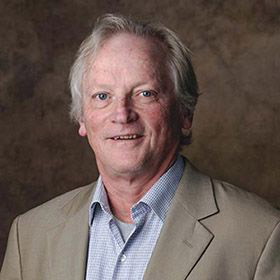 The 2019 featured speaker is Frederick W. Alt, PhD. Frederick Alt received his Ph.D. in Biology from Stanford University in 1977 where he worked with Robert Schimke and discovered gene amplification and genomic instability in mammalian cancer cells. Alt moved to MIT for postdoctoral work with David Baltimore, where he helped elucidate basic principles of recombination in the immune system. His work with David Baltimore included the discovery that production of membrane versus secreted immunoglobulin is achieved via differential RNA processing and the discovery that allelic exclusion of Immunoglobulin (Ig) gene rearrangements is controlled by feedback from protein products. With Baltimore, Alt also elucidated major aspects of the V(D)J recombination mechanism, including involvement of site-specific DNA double strand breaks (DSBs) that are end joined, as well as the discovery of ”N” regions added by terminal deoxynucleotydl transferase (TdT) that provide a major source of antigen receptor diversity.Read More
The 2019 featured speaker is Frederick W. Alt, PhD. Frederick Alt received his Ph.D. in Biology from Stanford University in 1977 where he worked with Robert Schimke and discovered gene amplification and genomic instability in mammalian cancer cells. Alt moved to MIT for postdoctoral work with David Baltimore, where he helped elucidate basic principles of recombination in the immune system. His work with David Baltimore included the discovery that production of membrane versus secreted immunoglobulin is achieved via differential RNA processing and the discovery that allelic exclusion of Immunoglobulin (Ig) gene rearrangements is controlled by feedback from protein products. With Baltimore, Alt also elucidated major aspects of the V(D)J recombination mechanism, including involvement of site-specific DNA double strand breaks (DSBs) that are end joined, as well as the discovery of ”N” regions added by terminal deoxynucleotydl transferase (TdT) that provide a major source of antigen receptor diversity.Read More
Dr. Alt moved to Columbia University in 1982 as Assistant Professor of Biochemistry. He became Professor of Biochemistry and Molecular Biophysics in 1985 and HHMI Investigator in 1987. At Columbia, his lab established the role of Ig chains in regulating sequential stages of B cell development and discovered that all antigen receptor genes are assembled by a common V(D)J recombinase. They then elucidated a role for non-coding gene transcription in mediating "chromatin accessibility" as means to target the lineage, stage, and allele specific activity of the V(D)J recombinase. His group extended that work to show that, in B cells, IgH class switch recombination (CSR) to particular IgH classes is directed by activation of non-coding transcription units that contain the CSR target sequences. At Columbia, the Alt lab also co-discovered the N-myc cellular oncogene, based on its amplification in human neuroblastomas and he went on to characterize the Myc cellular oncogene family.
In 1991, Dr. Alt moved to Boston Children' Hospital (BCH) and Harvard Medical School as a Professor of Genetics and HHMI Investigator. He also became a Senior Investigator at the Immune Disease Institute (IDI). He was appointed Charles A. Janeway Professor of Pediatrics in 1993, Scientific Director of IDI in 2005, and Director of the Program in Cellular and Molecular Medicine (PCMM) at BCH in 2008. He also became President of IDI in 2010 and continues to serve as director since the merger of IDI with BCH, where it remains the PCMM. At BCH and IDI, Dr. Alt's group confirmed the proposal of Alt and Baltimore that N regions are added by terminal dexoynucleotidyl transferase, demonstrating that TdT is a V(D)J recombinase component. They also discovered that the joining activity of the V(D)J recombinase is carried out by a novel multi-component general cellular non-homologous DNA end joining now known as the major C-NHEJ DSB repair pathway. Subsequently, the Alt lab was involved in the discovery of a number of the first characterized NHEJ component factors and then went on to discover the key role of NHEJ proteins in maintenance of genomic stability.
The Alt lab continues to elucidate many new aspects of the mechanism and control of V(D)J recombination including discovering that this reaction is regulating by a process that allows the initiating RAG endonuclease V(D)J recombination factors to explore directionally within chromosomal loop domains for target substrates. His lab also continues to discover new aspects of the mechanism and regulation IgH CSR and the related process of Ig variable region exon somatic hypermutation. The lab's recent work, based on their development of high through-put methods to study DSBs and chromosomal translocations, have provided major new insights into the mechanisms that contribute to chromosomal rearrangements within the 3D genome of developing lymphocytes and cancer cells or their progenitors. The lab also has used their new approaches to identify a set of genes that recurrently break in neuronal stem and progenitor cells and, thereby, which may contribute to brain diversification and neuropsychiatric diseases and cancer. Most recently, the lab has built on their more basic molecular immunology discoveries on antibody gene assembly to generate innovative new mouse models for testing immunization strategies for eliciting HIV-1 broadly neutralizing antibodies.
Frederick Alt has been elected to the National Academy of Sciences, the Institute of Medicine (National Academy of Medicine), the American Academy of Arts and Sciences, and the European Molecular Biology Organization. His cancer biology awards include the American Association of Cancer Research Clowes Award, the Pasarow Foundation Prize for Extraordinary Achievement in Cancer Research, the National Cancer Institute Alfred K. Knudson Award for "Pioneering Contributions that Revolutionized the Field of Cancer Genetics", the Leukemia and Lymphoma Society de Villiers Award, The Katharine Berkan Judd Award from Memorial Sloan Kettering Cancer Center, the Albert Szent-Gyorgyi Prize for Progress in Cancer Research from the National Foundation for Cancer Research, and the American-Italian Cancer Foundation Prize for Excellence in Medicine. His immunology awards include the American Association of Immunologists (AAI) Huang Meritorious Career Award, the Cancer Research Institute (CRI) Coley Award, and the Novartis Prize for Basic Immunology. More generally, he has also received the Arthur Kornberg & Paul Berg Lifetime Achievement Award in Biomedical Science and the Lewis S. Rosensteil Prize for Distinguished work in Biomedical Sciences. Dr. Alt serves on numerous editorial boards and is Editor in Chief of Advances in Immunology. He also serves on many national and international advisory boards and is currently Chair of the Scientific Advisory Committee of the Cold Spring Harbor Laboratory. Dr. Alt has mentored over 100 students and research fellows, many of whom have become leaders in immunology, genetics, or cancer biology and he received the American Association of Immunologists Excellence in Mentoring Award and the Willam A. Silen Award for Lifetime Achievement in Mentoring from Harvard Medical School. The Cancer Research Institute of New York annually presents the Frederick W. Alt Award for New Discoveries in Immunology.
(03/10/19)
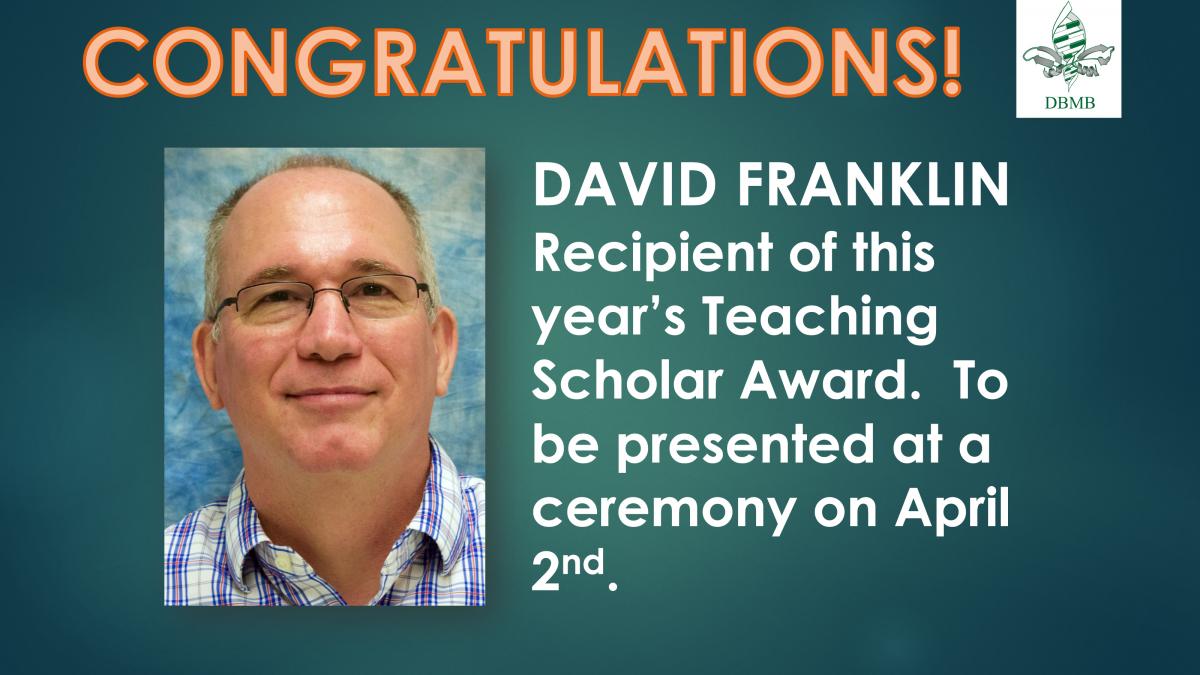
(03/08/19)
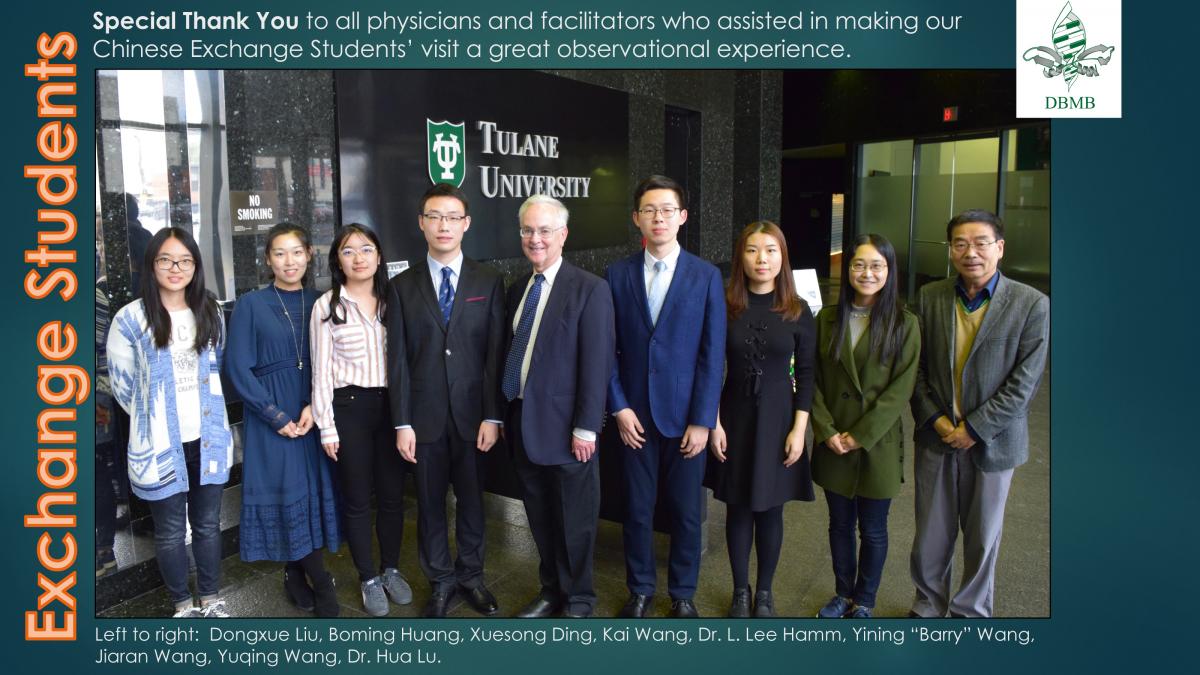
(03/08/19)
UPDATE: One Year Masters Students
By David Franklin, PhD
Here is an update of the One-Year MS stats, and where our Graduates stand with respect to reaching their ultimate goals.
We have a 100% graduation rate of 75 students since 2012. This obviously does not include our 28 present MS students.
88% of our graduates got accepted into at least 1 professional school of their choice (allopathic medicine, osteopathic medicine, dental, veterinary, law, nursing). Many had multiple offers of acceptance. Corey Carney has the record, with over 11 interviews and at least 5 acceptances. I think we should highlight Corey sometime soon, but after he picks which school he will attend in the Fall. I believe Tulane is still in the running.
7% of our graduates used their degree to get into the workforce and are gainfully employed. These were generally students who didn’t perform academically in the MS program to a level that would allow me to mentor them for medical school admissions. I instead advised them to use the degree in another fashion, which they did.
5% of our graduates are applying, and have been in at least 1 full admissions cycle. I am hopeful that each can get acceptance soon.
Not included in these numbers are graduates who have not yet had at least one full admissions cycle. They also don’t include our 28 present MS students.
Our MS graduates have been accepted to: Tulane School of Medicine (including one in the PSP program), LSUHSC (New Orleans and Shreveport), LSU School of Veterinary Medicine, LSU School of Dentistry, LSU School of Nursing, University of Queensland / Ochsner Program, Meharry School of Medicine, University of Illinois College of Medicine, University of South Carolina Medicine, University of Southern Alabama, Geisinger Commonwealth School of Medicine, Virginia Commonwealth University School of Medicine, University of South Florida Morsani School of Medicine, University of South Alabama Medical School, University of Miami Miller School of Medicine, Texas A&M College of Medicine, Texas Tech University School of Medicine, Mercer University School of Medicine, University of Arkansas for Medical Sciences Medical School, University of Mississippi Medical Center, University of New England School of Osteopathic Medicine, and Touro University Nevada School of Osteopathic Medicine.
(02/22/19)
SYNERGY 2018 EVENT A MEMORABLE OCCASION
A quack, a queen and a trip around the moon were part of the highlights of this year’s Department of Biochemistry and Molecular Biology (DBMB) Departmental 7th Annual Academic Synergy (AAS) Retreat, held December 12th in Room 111A of the J. Bennett Johnston Building.
This event was somewhat of a homecoming for former department professor Dr. William Baricos, who retired in 2002. Dr. Baricos presented a lecture entitled “A quack, a queen and a trip around the moon”, featuring some of our more interesting and colorful chairs from the past.
Following retirement Dr. Baricos researched and wrote Biochemistry at Tulane Medical School: 1834-2010. This informative history spans the early years of the university, then know as the Medical College of Louisiana.
In addition to the lecture, department chair Dr. Hua Lu provided a review of 2018, giving statistics for the year and many of the highlights, such as the annual retreat and accomplishments in the department.
Over 100 guests attended this year’s annual event and partook of luncheon fare from Cottage Catering, including a “TU” shaped King cake in Tulane colors.
(12/24/18)
Special Lifetime Recognition
Congratulations to Dr. Hua Lu, Professor and Chair in the Department of Biochemistry and Molecular Biology, AAAS Honors Accomplished Scientist as a 2018 Elected Fellow. The American Association for the Advancement in Science has bestowed upon 416 of its members the lifetime honor of being elected a Fellow in recognition of their extraordinary achievements in advancing science.
On November 27th the Fellows announced that honorees will be recognized at the 2019 AAAS Annual Meeting in Washington, DC, during a Fellows Forum on February 16th. At that time they will be presented with an official certificate and the AAAS Fellows’ gold and blue rosette pin, the colors which represent their respective fields of science or engineering.
(12/24/18)
Jill Barbay receives President’s Staff Excellence Award
Congratulations to Senior Department Administrator Jill Barbay, winner of the Tulane President’s Staff Excellence Award for 2018. The award was presented by Tulane President Michael Fitts in Jill’s office at the School of Medicine.
The President’s Staff Excellence Awards are bestowed every year to top University staff employees who best represent high achievement in their contributions to the University. Those nominated will have achieved outstanding success in one or more of the following areas: Increased Productivity, Cost Savings, Enhanced Objectives, and Humanitarianism.
(12/24/18)
Publications, September 1st, 2018 - December 31st, 2018
The below list represents publications by faculty for the period September 1st-December 31st, 2018.
Blake, Diane, PhD
Quesada-González, D., Jairo, G.A., Blake, R.C. 2nd, Blake, D.A., and Merkoçi, A. (2018) Uranium (VI) detection in groundwater using a gold nanoparticle/paper-based lateral flow device. Sci Rep. 2018 Nov 1;8(1):16157. doi: 10.1038/s41598-018-34610-5
Sahiner, N., Sagbas, S., Sahiner, M., Blake, D,A., and Reed, W.F. (2018) Polydopamine particles as nontoxic, blood compatible, antioxidant and drug delivery materials. Colloids Surf B Biointerfaces. 2018 Sep 11;172:618-626. doi: 10.1016/j.colsurfb.2018.09.019. [Epub ahead of print]
Sahiner, M., Sahiner, N., Sagbas. S., Fullerton, M.L., and Blake, D.A. (2018) Fabrication of biodegradable poly(naringin) particles with antioxidant activity and low toxicity. ACS Omega, in press.
Jackson, James, PhD; Niu, Tianhua, PhD
Ungerleider, N.A., Rao, S.G., Shahbandi, A., Yee, D., Niu, T., Frey, W.D., Jackson, J.G. (2018) Breast cancer survival predicted by TP53 mutation status differs markedly depending on treatment. Breast Cancer Res. 2018 Oct 1;20(1):115. doi: 10.1186/s13058-018-1044-5.
Shahbandi, A. and Jackson, J.G. (2018) Analysis across multiple tumor types provides no evidence that mutant p53 exerts dominant negative activity. NPJ Precision Oncology, in press.
Liu, Hong, PhD
Hu, L., Huang, H., Hei, M., Yang, Y., Li, S., Liu, Y., Dou, Z., Wu, M., Li, J., Wang, G.Z., Yao, X., Liu, H., He, X., and Tian W. (2018) Structural analysis of fungal CENP-H/I/K homologs reveals a conserved assembly mechanism underlying proper chromosome alignment. Nucleic Acids Res. 2018 Nov 8. doi: 10.1093/nar/gky1108. [Epub ahead of print]
Lu, Hua, MB, PhD
Lu, H. (2018) New players critical for breast cancer. J Mol Cell Biol. 2018 Aug 1;10(4):271-272. doi: 10.1093/jmcb/mjy046.
Wang, H., Liao, P., Zeng, S.X., and Lu, H. (2018). It takes a team: Gain- of-function Story of p53-R249S. JMCB, in press.
Machado, Heather, PhD
Nelson, A.C., Machado, H.L., and Schwertfeger, K.L. (2018) Breaking through to the Other Side: Microenvironment Contributions to DCIS Initiation and Progression. J Mammary Gland Biol Neoplasia. 2018 Aug 31. doi: 10.1007/s10911-018-9409-z. [Epub ahead of print] Review.
Behbod, F., Gomes, A.M., and Machado, H.L.(2018) Modeling Human Ductal Carcinoma In Situ in the Mouse. J Mammary Gland Biol Neoplasia. 2018 Aug 25. doi: 10.1007/s10911-018-9408-0. [Epub ahead of print].
(12/24/18)
Newsworthy
Congratulations to Dr. Hong Liu, recipient of an Outstanding Achievement in Receiving a First R01 Award, at the SOM Faculty Retreat, Audubon Tea Room, October 30th, 2018.
Congratulations to Shantanu Guha, who won Best Overall Presentation at the Annual BMS Retreat, held at the Audubon Tea Room, October 26th, 2018.
Congratulations to Zane Gray, Research Tech in the Machado Lab, accepted to Tulane School of Medicine.
(12/24/18)
Milestones
Congratulations to the following members of the department who are celebrating milestone anniversaries at Tulane.
Diane Blake, PhD
25 Years
Gilbert Estrada
25 Years
Samuel Landry, PhD
25 Years
William Wimley, PhD
20 Years
(12/24/18)
